#this is absolutely fundamental to my understanding of his character
Explore tagged Tumblr posts
Text
Criticism of Winick's version of the Red Hood (as in, criticism of Jason's character and most often his morals) comes in three flavours imo:
#1: the "killing is always fundamentally inherently bad" crowd, which, at this point, can't really argue with that. If someone has the belief that actions are inherently good or evil and the intentions and weighing of consequences doesn't matter, then they're gonna hate the utilitarian, that does make sense, I fundamentally disagree with the ethics of it but I can respect the coherence.
#2: criticism of Jason's politics that is absolutely valid and was 100% put there on purpose by Winick as a parallel to Bruce to highlight those flaws in Bruce. "Jason's way doesn't work he became a drug lord and imposed a violent system! What? Who's Matches Malone?"/ "But Jason kills and wants to build a system based on violence! Meanwhile Batman just works with the police and tosses criminal in prison!"/ or, maybe my absolute favourite, which was "Jason is clearly a terrorist because he uses fear to try and influence people" which I don't think requires any commentary. Point is, Winick's Jason has very real flaws, and I don't like some of them in terms of meta because he's using jason as a blank slate to the discredit of jaybin, but those flaws are extremely intentional and veering at criticizing Bruce's character, very much here specifically to point out Bruce's flaws and failing, which makes it all the weirder to me how most of these Jason antis don't actually hate Bruce for any of it, they're on Bruce's side of the debate and using arguments against Jason that I'm convinced were designed specifically to shit-talk Bruce, so that's kinda baffling. Aka, I agree with that criticism and I understand if people hate Jason for it, but if people hate Jason for those specific reasons but don't hate Batman for them, I am squinting heavily.
#3: shit Jason literally didn't do. "He retraumatized Bruce and Mia! He called Mia diseased! He tried to kill teenagers Mia and Tim!" He... very much did not do that. Why are you making shit up. He did a whole bunch of fucked up things that are perfectly worthy of criticism (see point #2)! He's been chopping heads off and blowing up goons why are you up in arms with him fighting people his age he is literally a non-lethal age-appropriate villain for them meanwhile he launched a rocket into black mask's building he introduced himself by throwing a duffle bag of chopped heads on a table he's killed goons so low-ranked as car drivers (in uth specifically) he sent a decoy to be killed by Black Mask in his stead just to see Bruce's reaction (i've always wondered what that guy did to deserve that in Jason's books tbh) it's like he did so many actual gruesome things why do you guys feel the need to make shit up honestly.
So yeah. There's not necessarily a big conclusion to that just, stuff i've been seeing so far. Obviously you're totally allowed to hate Winick's Jason (he is not my favourite jason writer by any means). I just think it's interesting to ponder.
97 notes
·
View notes
Text
ritsu kageyama is the kind of guy to realize post canon that he’s turning 14 soon and going through puberty and is therefore reaching the part of his life where he’s Supposed to be undergoing Teenage Rebellion (big cleanup arc doesn’t count that was an identity crisis) so he googles “teen rebellion ideas” “teenage rebellion wikihow” “what to do as a rebellious teenager” and spends 3 hours meticulously making a list of all the things he should be doing to be a Rebellious Teenager and then deliberately and efficiently does them one item at a time. and at no point does he ever consider that this is kind of an insane thing to do
975 notes
·
View notes
Note
Hi! If it’s not too much, could you do spider-man villains responding to an underling hitting reader like you did for the bat-villains? (Idk if you do the spider-man villains or just marvel villains in general so feel free to do that if you’d prefer) You’re really good at getting into characters’ heads it’s really fun to read!
MARVEL COMICS VILLAINS X FEM!READER
One of the underlings hit you and your partner finds out
Characters: Dr. Doom, Bullseye, Taskmaster, Loki, Crossbones, Zemo, Muse, Hela, Green Goblin, Eddie/Venom, Doctor Octopus, Kraven, The Lizard, Carnage, Electro, Kingpin, Scorpion, Hobgoblin, Mysterio, Sandman, Shocker, Chameleon, Mister Negative & Boomerang
Reply to anon: FINALLY some love for Spider-Man villains. The Spider-Man and Batman villain gallery are my favorites. I've done (almost) all of Spider-Boy's most popular villains, I really hope I did the ones you wanted.
Victor von Doom | Doctor Doom
- Doom is not a man prone to outbursts. He does not rage blindly, does not allow emotions to dictate his actions. No, his fury is measured, calculated—and when he sees the mark left on your perfect skin, he does not waste words. He simply turns, his cloak billowing as he leaves. You know better than to stop him. Whatever is about to happen is inevitable. Doom does not tolerate offenses. And this—this was the gravest of all.
- The punishment is not merely death. Death is merciful, death is quick. Doom does not grant mercy to those who defile what is his. The offender is stripped of their name, their purpose, their very existence. Doom ensures they are erased, their presence scoured from the annals of time, their life reduced to a whisper of agony. He does not need to sully his own hands—no, the world itself bends to his will, and his will is retribution.
- When he returns to you, his mask betrays nothing, but you can feel the weight of his gaze, the intensity that lingers. He reaches for you—not to inspect the wound, not to seek forgiveness, but to claim you once more, to remind you that you belong to him, and he to you. "None shall harm you and live," he states, as if it is a fundamental truth of the universe. And perhaps, under his rule, it is.
- His gauntleted fingers ghost over your skin, a contradiction of metal and reverence, of cold steel and burning devotion. "You are under my protection," he murmurs, "and my protection is absolute.” His lips brush against your temple, the touch fleeting, possessive. "They will remember what happens to those who forget."
Lester | Bullseye
- He doesn't get angry. Not at first. He just stares at you, head tilting slightly, the way a predator assesses a kill. And then—he laughs. Not the usual, cocky, self-satisfied kind. No, this one is sharper, colder, something that sends a chill down your spine. "They really put their hands on you?" he asks, his voice edged with something deadly, something thrilled. Because now? Now he gets to play.
- He finds them fast. He doesn’t rush—no, he takes his time. He enjoys watching the moment of realization dawn, the way fear blooms when they understand exactly who they’ve pissed off. And when he strikes, it isn’t just a kill. It’s an art form. He breaks bones with pinpoint accuracy, flays skin with nothing but the flick of a blade. Every hit is personal, every wound a lesson. By the time he’s finished, there’s nothing left but ruin.
- When he comes back, he’s still grinning, like he’s high off the violence. He leans in close, voice dripping with amusement. "Y’know, I was gonna kill ‘em quick, but then I thought—nah, let’s make it memorable." His fingers trace the bruise on your skin, eyes dark with something almost hungry. "Bet they won’t be hittin’ anyone ever again. Hell, they won’t even be breathing."
- Then, just as suddenly, the danger flickers, shifts into something else. His hand curls around the back of your neck, pulling you in, his lips brushing against yours, slow and deliberate. "Next time, babe? Just say the word. I'll tear the whole damn world apart for you."
Tony Masters | Taskmaster
- Tony doesn't ask what happened—he sees it. The way you shift your weight, the slight tension in your jaw, the way your hand lingers over the injury just a second too long. He catches every detail, every weakness, because that’s what he does. And right now? Right now, someone’s weakness is about to become their death sentence.
- He doesn't just kill the bastard. No, that would be easy. He studies them first. Watches their movements, their stance, every tell in their body. And then? Then he dismantles them. Uses their own techniques against them, mirrors their every move just to show them how outmatched they are. By the time he’s done, they don’t just lose. They know they never stood a chance.
- When he returns, there’s no grand declaration, no need for theatrics. He just sits beside you, arms crossed, gaze sharp and assessing. "You alright?" he asks, and it’s almost casual—almost. But there’s a weight to it, an unspoken promise beneath the words. You nod, and he exhales, rolling his shoulders. "Good." A beat. Then, "Don’t let it happen again."
- But later, when the lights are low and his guard is down, his hand drifts to your hip, his thumb brushing slow, idle circles against your skin. "Ain't nobody touches you but me," he mutters, voice rough, possessive. "And I don't do soft." His lips ghost over yours, teasing, taunting. "But for you? Maybe I’ll make an exception."
Loki Laufeyson
- He does not react at first. He simply observes. Fingers steepled, expression unreadable, eyes too calm. And that? That is far more terrifying than rage. Because Loki is not a creature of impulse. He is a creature of calculated destruction. And this? This offense against you? It will be answered with something far worse than death.
- The punishment is poetic. He does not simply kill the offender—he undoes them. Twists their mind until they are unmade, until they do not know their own name, their own face. They become a whisper, a tragedy, a thing lost to the very fabric of reality itself. And Loki? Loki watches, amused, as they break. "Oh, dear," he muses. "It seems you have forgotten yourself. Allow me to help." And with a flick of his fingers, they are gone.
- When he returns to you, there is a smirk curling at his lips, something self-satisfied in his gaze. "It is done," he says simply, as if he has merely handled a small inconvenience. And perhaps, to him, that’s all it was. But then, his expression shifts—just slightly. His fingers ghost over your wrist, featherlight, careful, as if you are something fragile, something to be preserved. "They will not bother you again," he murmurs, "nor will anyone else."
- His arms encircle you, drawing you against him, and for a moment, there is no trickery, no illusion—just him, real and solid. His lips graze your ear, a whisper of silk and steel. "You are mine," he breathes, and there is something almost reverent in the way he says it. "And I do not share."
Brock Rumlow | Crossbones
- The moment he sees the bruise on your skin, something inside him snaps. There’s no slow burn, no measured response—just instant, blistering rage. Brock doesn’t ask who did it. He already knows. He doesn’t ask why. It doesn’t matter. All that matters is the fact that someone was stupid enough to lay a hand on you, and now? Now they have to pay.
- He doesn’t just kill them—he annihilates them. There’s no finesse, no mercy, just raw, unfiltered violence. The crack of bone, the wet sound of flesh giving way—he takes his time, makes it hurt. He wants them to understand what they’ve done. Wants them to feel every ounce of pain they dared to bring upon you. By the time he’s done, they’re nothing more than a broken, unrecognizable mess on the floor.
- When he comes back to you, his knuckles are split, his breathing heavy, his hands still trembling with the aftershock of violence. But when his eyes meet yours, the fury melts into something else. Something dark, something possessive. He reaches for you, fingers rough as they trace over your injury, his touch lingering, slow. "Ain't nobody touches what’s mine," he mutters, voice like gravel, low and sharp with promise. "Nobody."
- And then his grip tightens, just enough to remind you, just enough to claim. His lips brush against your ear, his breath hot against your skin. "Next time?" His voice drops to a whisper, deadly and sweet. "I won’t just kill ‘em. I’ll make sure they beg for it first."
Helmut Zemo
- Zemo is silent when he sees the mark on you. Too silent. The kind of quiet that is far more dangerous than any outburst, far more lethal than raised voices or shattered glass. His fingers ghost over the injury with a gentleness that feels almost deceptive, his expression unreadable, his mind already working, already planning.
- His revenge is not messy. It is not violent. It is precise. He does not grant them the dignity of an immediate death—no, he dismantles them. Strips them of their status, their power, their very identity. He orchestrates their downfall with the patience of a man who thrives on the long game, ensuring they lose everything before he grants them the release of death. By the time he is finished, they are nothing more than a ghost.
- When he returns to you, his movements are slow, deliberate. He cups your face, tilting it up so you can see the satisfaction glinting in his eyes. "It is done," he murmurs, his thumb brushing over your cheek with something almost reverent. "They will never so much as whisper your name again."
- Then, his lips graze your temple, lingering there, soft but unshakable. "No one lays a hand on you and lives," he breathes against your skin. "Not while I still draw breath."
Muse
- He doesn’t react at first. No flicker of emotion, no shift in expression—just a slow, almost languid turn of his head as he processes the fact that someone dared to harm you. And then, after a moment of silence, he smiles. It’s not warm, not reassuring—it’s something else. Something wrong. Something that should send chills down your spine.
- The underling doesn’t just die. No, Muse creates with them. He turns them into something grotesque, something artful. He strips them of their humanity in the most literal sense, carving into their flesh with the same care a sculptor takes to marble. When he’s finished, they are unrecognizable, their body a message, a masterpiece. Something for the world to witness.
- When he returns, his hands are still wet with blood, his smile still stretching a little too wide. He steps closer, tilting his head as he looks at you, as if seeing you for the first time. "You make me feel things I do not understand," he murmurs, his voice lilting, almost dreamlike. "And yet, I do not mind."
- His fingers trail over your bruised skin, slow, thoughtful. "You are mine," he hums, as if tasting the words. "And I do not take kindly to those who ruin my muse."
Hela
- Her rage is not loud. It does not explode. It devours. A slow, insidious thing that coils around her like smoke, seething just beneath the surface. She does not speak when she sees the mark on your skin. She does not need to. The air itself seems to grow heavy, the very shadows bending toward her as if they fear what is to come.
- She does not simply kill the one responsible—she eradicates them. Their soul is hers now, ripped from their body, condemned to an eternity of suffering in her grasp. She ensures their torment is endless, their agony woven into the very fabric of Hel itself. They will know true despair. They will beg for release, and she will deny them.
- When she returns to you, she does not ask if you are alright. She knows you are. You are strong. But still, her touch is almost gentle as she brushes a gloved hand over your bruised skin, as if assessing the damage, as if reminding herself that you are here. "They are nothing now," she murmurs, voice like velvet over steel. "They will never touch you again."
- Then, she cups your chin, tilting your face up to meet her gaze. Her lips curve into a smirk, dark, knowing. "You are mine," she breathes, her voice a silken promise. "And what is mine is untouchable."
Norman Osborn | The Green Goblin
- He is not a man known for softness. The world has felt the wrath of his intellect, his madness, his power—but never his kindness. Yet, in his own way, you are an exception. An obsession that burrowed into his mind and refused to leave. You were his, a claim as absolute as the empire he built with blood and fire. And when one of his men struck you, something terrible and ruinous cracked open within him. Norman does not react with immediate fury. No, his rage is patient, a slow-moving thing with sharpened teeth, and it festers in silence as he watches you, as his gloved hand ghosts over the mark left behind. His voice is eerily calm. "Who?" is all he asks, and though you know what will come, you do not stop him.
- He does not waste time. The moment the name is given, the air shifts, heavy with the weight of his impending vengeance. He could kill the man outright—could rip him apart with his hands and laugh as he did it—but Norman is nothing if not poetic. There is no need for theatrics, no need for a Goblin’s grin. He strips away his mask and handles the matter as Osborn, the man, the king, the ruthless god in a businessman’s skin. His underlings learn a lesson that night: a punishment that stretches long, a display of control so profound that even those loyal to him shudder at the sight. Norman does not simply kill; he dismantles.
- He returns to you in the aftermath, his fingers still stained with evidence of his wrath. There is no apology, no soft words meant to soothe. He does not think you need them. He takes your face in his hands, holds you as if committing the shape of you to memory, and leans in, his forehead resting against yours. "You are not to be touched," he murmurs, his voice laced with something dark, something final. "Not by them. Not by anyone. Only me." His mouth finds yours, claiming and bruising, a reminder of who you belong to, of who would set the world ablaze before letting another lay a hand on you.
- In the days that follow, his men become more careful, their eyes lowering whenever you pass. He revels in it, in their fear, in the knowledge that you are untouchable. But more than that, Norman basks in the way you still stand at his side, still allow his hands on your skin, still whisper his name in the quiet of night. He does not say it aloud, but he knows it in the marrow of his bones: he would burn everything for you.
Eddie Brock | Venom
- The moment Venom senses it, the moment the bruising scent of pain clings to you, Eddie is already moving. His body tenses like a predator scenting blood, fists curling, jaw tightening, and before you can say anything, a voice darker than night slithers out, a guttural growl vibrating in his chest. "Who hurt you?" The question is not for you to answer. Venom already knows.
- There is no reasoning with Eddie when his rage is ignited, no space for rational thought. He is a man of fury, of primal justice, and there is no justice more absolute than the one he will deliver. Venom is delighted, saliva dripping from his fanged mouth as he urges Eddie forward. "We eat them." But Eddie is not in the mood for quick endings. No, this calls for something more intimate. He corners the man, fists colliding with flesh, with bone, and with each hit, his breath comes harsher, his mind consumed by the vision of you hurt, of someone daring to lay a hand on what is his.
- When he returns to you, his knuckles are bloody, his breathing uneven, but his eyes—his eyes are the most dangerous part of him. "It won’t happen again," he says, and Venom’s voice purrs in agreement, curling around the words like a promise. You reach for him, fingers tracing over the remnants of his anger, and for a moment, his fury falters. His grip tightens around you, desperate, possessive, as if anchoring himself in your warmth. "I don’t share," he murmurs, his lips ghosting over your skin, the rough scrape of his stubble sending a shiver down your spine. "I don’t forgive, either."
- The city speaks in whispers after that. The man who struck you is nowhere to be found, his existence erased with the efficiency of something monstrous. Eddie doesn’t care. Venom doesn’t care. They are satisfied only in the way you still let them near, in the way your fingers tangle in Eddie’s hair as he presses against you, breathing in your scent like a man who has only ever known hunger.
Otto Octavius | Doctor Octopus
- He is a man of brilliance, of intellect, of control. But all of it fractures when he sees the mark on your skin. His metal limbs twitch, their claws clicking in restless anticipation, and his grip on his own restraint becomes tenuous. He prides himself on logic, on the ability to calculate his moves, but rage has always been an old friend, and tonight, it whispers to him with venomous sweetness. He cups your chin, his touch unexpectedly gentle despite the storm brewing in his gaze. "Tell me," he says, his voice like silk stretched over steel.
- When you do, he does not explode. Otto Octavius is not a man of reckless outbursts—he is a man of consequences. The one who hurt you does not suffer immediately. No, Otto drags it out, makes it a lesson, makes it art. His tentacles wrap around the man like a vice, lifting him effortlessly, squeezing just enough to let terror sink in. "Do you know what you’ve done?" he muses, tilting his head in that calculating way of his. "Do you understand the depths of your mistake?" There is no mercy in his eyes, only the cold brilliance of a scientist dissecting his latest subject.
- When he returns, his hands are clean, his composure intact. But there is something different in the way he looks at you, something almost reverent. "No one will touch you again," he says, a quiet promise that rings louder than any scream. His arms coil around you, steel and flesh alike, pressing you into him as if ensuring your safety through sheer proximity. He is not an affectionate man, not in the traditional sense, but this—this is devotion in its truest form.
- The world shifts after that. His subordinates tread carefully, their fear evident, their respect unwavering. Otto does not care for their opinions, only for the knowledge that you are untouchable, that the universe itself would have to shatter before he allowed harm to reach you again. And when he holds you at night, when he feels the warmth of your body against his own, he knows with absolute certainty—he would burn every last one of them for you.
Sergei Kravinoff | Kraven the Hunter
- The air is thick with tension when he finds out. There is no great display of fury, no immediate act of violence—but the shift in him is undeniable. His gaze darkens, his jaw sets, and his muscles coil like a beast moments before the kill. He does not ask you to name the culprit. He does not need to. The hunt is already beginning in his mind, the scent of blood calling to him. "They have wronged you," he murmurs, his accent curling around the words like a snare. "That is all I need to know."
- He does not go after them as a man. He goes as a predator. There is no chance for escape, no hope for mercy. The one who hurt you does not simply die; they are hunted, chased, reduced to nothing more than prey beneath the weight of Sergei’s wrath. And when he returns, there is blood beneath his nails, a satisfied smirk on his lips, and something primal burning in his eyes as they settle on you.
- He takes your face in his hands, his fingers rough yet reverent. "You are mine," he tells you, his voice low, possessive, unshaken. "And no man touches what is mine." There is no hesitation when he kisses you, no gentleness—only the raw, unfiltered hunger of a man who has conquered and claimed.
- After that, there is silence. No one dares cross you, no one even dares look too long. And Sergei—Sergei watches you like the wild thing he is, his need for you carved into his very soul.
Dr. Curt Connors | The Lizard
- There are two versions of the man you love, and both are dangerous in their own ways. Dr. Connors—the brilliant, fractured scientist—sees you as something fragile, something to be protected. The Lizard—the monstrous, primal force—sees you as his, an undeniable part of his territory, a possession no one else is permitted to touch. When he smells the injury, when his reptilian senses detect the slightest irregularity in your scent, his pupils slit into thin lines, and his talons twitch. He does not ask what happened. He does not need to. You can see the change in him, the slow, deliberate way his muscles coil, the predator awakening beneath the man.
- Curt tries to hold back at first, tries to reason with himself, to suppress the darker part of him that howls for blood. But then he sees the mark—small, insignificant in the grand scheme of things, but a wound on you—and all his restraint shatters. His skin ripples, the transformation taking hold, scales pushing through flesh, bones shifting as something cold-blooded and relentless takes over. The man who hurt you does not get the mercy of a warning. He does not get the chance to run. The Lizard hunts him down with terrifying precision, dragging him into the depths of the sewers, where screams do not reach the surface world.
- He does not return to you as Curt, not yet. The Lizard comes first, his body tense with the aftermath of his fury, his eyes glowing in the dim light. He circles you like an animal, sniffing the air, ensuring no scent of your attacker lingers. When his clawed hands cup your face, they are gentle despite their lethal potential, his rough thumb tracing over the bruise with something close to reverence. "Mine," he hisses, low and guttural, his tail twitching behind him. "No one hurts what belongs to me." His forked tongue flicks out, tasting the air around you, confirming you are safe. Only then does he allow himself to shift back, bones snapping, scales melting away, until it is Curt again—shaken, horrified by his own lack of control, but unrepentant.
- After that night, no one in his employ ever touches you again. They don’t even stand too close. The fear lingers, thick and suffocating, but you do not fear him. Not truly. Not when he presses his forehead against yours in the quiet of your shared sanctuary, his breath still uneven from the monster within him. "I won’t let it happen again," he murmurs, half a promise, half a warning to the world. And you believe him.
Cletus Kasady | Carnage
- Violence has always been Cletus’s language, and love—if he can even call what he feels for you that—is simply an extension of it. His affection is red, dripping, chaotic, something sharp-edged and all-consuming. So when he finds out someone has dared to touch you, to lay their filthy hands on what he claimed, he does not fly into a rage. No, no, no. Rage is too simple. Rage is what lesser men feel. What he feels is a different kind of thrill—something euphoric, something electric. The knowledge that he now has an excuse to indulge himself, to play.
- He finds the man easily. Carnage is not subtle, never has been, and there is no need for stealth when the hunt is half the fun. He takes his time with it, drags it out, makes sure the bastard understands the mistake he made. There are screams, of course. Begging. Pleading. But Cletus only laughs, red tendrils writhing around him like something alive, his grin wide and wicked. He does not just kill. He desecrates. When it is over, he leaves what remains in a place everyone will see, a message written in blood and viscera: SHE’S MINE.
- When he returns to you, he is still drenched in his work, red creeping up his neck like war paint. His fingers are slick when they cup your chin, tilting your head so he can drink in the sight of you, the only thing in this world he won’t destroy. "Ain’t nobody stupid enough to touch you now, doll," he purrs, his grip tightening just enough to make you gasp. "But if they do… well, you know me. I love an excuse to get messy." His lips crash against yours, feverish, unhinged, tasting of copper and chaos, as if marking you from the inside out.
- The city whispers after that. Everyone knows. Everyone fears. No one dares even breathe in your direction without permission. And Cletus—Cletus is delighted. He keeps you close, always touching, always claiming, because you are the only thing in this world worth keeping, worth loving in his own sick, twisted way.
Max Dillon | Electro
- The moment Max finds out, the air around him changes. The temperature rises, the hum of electricity vibrating beneath his skin, flickering in his veins. He does not speak at first. He just stands there, his entire body coiled with tension, eyes burning with a glow that promises something catastrophic. His hands twitch, sparks crackling between his fingers, and when he finally breathes, it comes out ragged, barely contained. "Who?" The question is not a request. It is a demand, static lacing his voice like a storm on the verge of breaking.
- He doesn’t wait for you to answer. He already knows. The circuits in the building whisper their secrets to him, security cameras playing back every movement, every offense. And once he sees it—once he witnesses the insult—there is no saving the man responsible. Max does not go after him in silence. He wants people to see. He wants them to understand. When he finds his target, he doesn’t touch him at first—just lets the lights flicker, lets the air taste of ozone and danger. The fear in the man’s eyes is intoxicating. And then—then—he strikes.
- He does not just kill. He erupts. A violent surge of electricity courses through his victim’s body, lighting up the night in a gruesome spectacle. It is over in seconds, but the aftermath lingers—charred flesh, the stench of burnt skin, a warning that echoes in the city’s power lines. No one touches what belongs to Max Dillon. No one.
- When he returns, his pulse is still thrumming with energy, his hands still tingling with remnants of power. He doesn’t apologize. He doesn’t need to. He simply cups your face, his touch still buzzing, his breath warm against your lips. "Nobody hurts you," he murmurs, pressing his forehead against yours, letting the electricity between you crackle softly. "Not while I’m around."
Wilson Fisk | The Kingpin
- There is no explosion of rage when Wilson finds out. No immediate outburst, no reckless display of violence. Instead, there is silence. A heavy, suffocating quiet that settles over the room as he absorbs the information, as he lets the weight of it sink into his bones. He does not ask questions. He does not need to. His mind has already moved past the why and straight into the how.
- The man who struck you is dead before the sun rises. Wilson does not delegate this task. He handles it himself, in the cold, calculated way that only he can. The punishment is not just a beating. It is an education. He ensures that every broken bone, every gasping breath, is a lesson. That by the time it is over, the man understands—truly understands—who you belong to.
- When he returns to you, his suit is pristine, his composure unshaken, but there is something in his eyes—something dark, something possessive. He takes your hand, bringing it to his lips, pressing a slow, deliberate kiss to your knuckles. "You are mine," he states, as if it is law, as if it is the only truth that matters. "And I will never allow harm to come to what is mine."
- The city learns quickly. No one touches you. No one dares. Because to harm you is to invoke the wrath of a king, and there is no place in this world where his reach does not extend.
Mac Gargan | The Scorpion
- Mac has always been a creature of violence. It sits in his bones, coils in his muscles, waiting for an excuse to strike. But this—this—is different. This is not a bar fight, not some petty vendetta. This is you. His girl. His one good thing in a world that never gave him anything but rage. And someone thought they could lay a hand on you? His fingers curl into fists so tight his knuckles crack, his breath coming out in short, harsh bursts. The suit hums around him, reacting to his anger, tail twitching like a serpent poised to strike.
- He doesn’t speak. He doesn’t ask. He hunts. The city is a labyrinth of shadows, but Mac is a predator who knows every back alley, every bolt hole. And when he finds the bastard, there’s no warning. No time for apologies, for begging, for mercy that never existed in the first place. He slams the man against a wall hard enough to rattle bones, his tail curling around his throat, lifting him off the ground with slow, deliberate cruelty. "You think you're tough?" His voice is low, venomous, dripping with the promise of pain. "Think you can put your hands on her and walk away?"
- The fight is short, brutal. Mac doesn’t just beat him—he breaks him. Leaves him gasping in the filth of the streets, bruised, bloodied, and barely breathing. He could end it. Should end it. But no, he wants this bastard to live. Wants him to wake up every day knowing he made the worst mistake of his life. That if he so much as breathes in your direction again, Mac will be the last thing he ever sees.
- When he returns to you, his hands are still shaking, but his grip is gentle when he cups your face, tilting your chin up so he can look at you. His expression is dark, possessive, fierce. "Ain’t nobody touching you again," he mutters, his thumb tracing over your skin, as if reassuring himself that you’re real, that you’re his. "Ever."
Roderick Kingsley | The Hobgoblin
- The first time he sees the mark on your skin, something inside him snaps. Roderick has always been meticulous, always prided himself on being in control, but this—this—is unacceptable. His fingers twitch at his sides, itching for violence, but his face remains eerily composed, the kind of stillness that only comes before a storm. He smiles, but it doesn’t reach his eyes. "Who?" he asks, voice soft, deadly. It’s not a question. It’s a promise.
- Roderick does not make a spectacle of his revenge. He is not like the others—messy, impulsive, obvious. No, he is calculated. He plays the long game, luring the fool into a false sense of security. Then, when the time is right, he strikes. The underling who dared touch you disappears, and for days, no one hears from him. Then, suddenly, his body turns up—dismembered, displayed with sickening artistry, a message written in his own blood. A warning.
- When he returns to you, there is not a single speck of blood on him. He is as immaculate as always, his movements smooth and practiced as he approaches you. His gloved fingers brush over your shoulder, over the place where the injury once was, his touch lingering. "No one will ever lay a hand on you again," he murmurs, voice silken but laced with something darker, something dangerous. "Not unless they have a death wish."
- He tilts your chin up with two fingers, studying you with that sharp, analytical gaze, and then he smiles—slow, lazy, possessive. "You belong to me, darling," he whispers against your lips, a ghost of a threat, a vow wrapped in silk. "And I always take care of what’s mine."
Quentin Beck | Mysterio
- Quentin is a master of illusions, a man who bends reality to his will. But this—this is no illusion. The sight of your injury is real. And that, more than anything, enrages him. He stands utterly still, his fingers twitching at his sides, his mind already spinning through a thousand different ways to fix this. "Someone put their hands on you?" His voice is eerily calm, too calm, like the surface of still water before something drags you under.
- He doesn’t just want revenge—he wants a show. Wants to make an example of the fool who thought they could harm his masterpiece. The man who hurt you wakes up in a nightmare. Shadows twist unnaturally around him, voices whisper from the darkness, and the air itself becomes suffocating. He cannot see. He cannot escape. Quentin lets him feel true fear, lets his mind break apart at the seams. And when he finally steps into the illusion, bathed in eerie green light, his voice is cold, theatrical. "You touched something that belongs to me. Now, let’s see how you like being toyed with."
- By the time the illusion fades, the man is reduced to a shaking, incoherent wreck, his mind so shattered that he will never be the same. Quentin does not need to dirty his hands with blood. He has already won. Fear is the best weapon, after all. And now? Now, no one will ever dare lay a hand on you again.
- When he returns, his touch is gentle, almost reverent, as he cups your face, tracing the curve of your jaw. "I’ve taken care of it," he murmurs, his voice carrying that ever-present theatrical flair, as if this was simply another act in a grand performance. "No one will ever hurt you again. Not while I’m around." And when he presses his lips to yours, it is possessive, a silent claim. You are mine. And I will burn the world before I let it take you from me.
Flint Marko | The Sandman
- Flint has never claimed to be a good man, but there are rules. Lines that even criminals don’t cross. And someone crossing you? That is unforgivable. When he sees the mark on you, the wound left by some lowlife under his command, something dark passes over his expression. His jaw tightens, his fists clench, and for a long moment, he just stares. Then, in a voice too quiet, too steady, he asks, "Who did it?"
- He doesn’t wait for the answer. He already knows. He finds him. And when he does, he doesn’t waste words. He doesn’t make threats. He just acts. His body twists and warps, arms elongating, fists turning into massive clubs of hardened sand. The first hit is brutal, sending the man crashing through a wall. The second is worse. By the time he’s done, the bastard is barely breathing, half-buried in the debris, coughing up blood and dust. Flint leans down, voice low, gravelly, dangerous. "You ever even look at her again, I’ll make sure there ain’t enough of you left to bury."
- When he returns to you, his hands are still rough, still calloused, but they are infinitely careful when they touch you. His fingers ghost over the mark, his brows furrowed in something like guilt, like regret that he wasn’t there when it happened. "I shoulda stopped it before it happened," he mutters, frustration lacing his tone. "Ain’t nobody layin’ a hand on you again. I promise you that."
- He presses his forehead to yours, his breath warm against your skin, his presence solid, steady, safe. And when he speaks again, his voice is softer, rough with something that sounds almost like devotion. "You’re the only thing in this world I ain’t gonna lose." And somehow, you know he means it.
Herman Schultz | The Shocker
- Violence has always been a means to an end for Herman, never something he enjoyed. He’s not one of those lunatics who relish brutality—he’s just a man trying to make a living. But when he sees the bruise marring your skin, the way you flinch ever so slightly when you move, something inside him curdles. His stomach twists, his fingers flex, and there’s a slow, creeping heat behind his eyes. Somebody hurt you. And that? That’s something he can’t let slide.
- He doesn’t go in guns blazing. He’s smarter than that. He finds out who did it first, who was stupid enough to lay hands on his girl. And when he does? He makes sure the message is clear. The vibrations from his gauntlets don’t just break bones—they shatter them. There’s no warning, no grand speech, just a quick, brutal demonstration of what happens when you cross him. The air trembles with every hit, and by the time he’s finished, there’s nothing left but wreckage and regret.
- When he comes back to you, he’s quieter than usual. There’s no bravado, no cocky grin—just a lingering tension in his shoulders, a ghost of something dark in his eyes. He hesitates before reaching for you, before brushing his knuckles ever so gently over the bruise. "Didn’t mean for you to get caught up in this," he mutters, voice low, rough with something close to guilt. "But I swear—it ain’t happenin’ again."
- And then, finally, his hands settle on your waist, pulling you against him, grounding himself in you. He presses his forehead to yours, exhales slow, deliberate. "You’re my girl," he murmurs, his voice softer now, steadier. "And I protect what’s mine."
Dmitri Smerdyakov | The Chameleon
- Dmitri is a man of masks, of deception, of control. And yet, when he sees the mark on your skin, all of that precision shatters. His breath slows, his body stills, and for the first time in a long time, something genuine flickers behind his ever-changing eyes. Fury. Not the theatrical kind, not the controlled, manufactured type—this is something raw, something visceral. Someone thought they could touch you and get away with it.
- He does not act in haste. No, he is patient, methodical. He waits. He studies his prey, slipping into their world, wearing faces they trust, whispering secrets that lead them straight to their downfall. By the time they realize what’s happening, it’s far, far too late. One night, they close their eyes—and when they wake, they are not where they were before. A cold, dimly lit room. A voice, smooth as silk, drips from the darkness. "Did you think I would not find you?"
- By the time he returns to you, there is not a single trace of blood on him. No evidence, no mess—only the ghost of a smirk, the flicker of satisfaction in his eyes. He steps close, fingers trailing over your wrist, up your arm, as if ensuring you are whole, untouched. "No one will ever hurt you again," he whispers, and it is not just a promise. It is fact.
- His lips brush against the shell of your ear, his voice a soft murmur, intimate, possessive. "You are mine, моя любовь. And I do not share what is mine."
Martin Li | Mister Negative
- There are two sides to Martin—light and shadow, kindness and wrath. But when he sees the evidence of someone else's violence on you, there is no kindness left. His breath catches, his fingers tighten into fists, and something in his expression shifts—something dangerous. He touches the injury gently, as if the very act of acknowledging it might taint you further. And then, quietly, almost too softly, he asks, "Who did this to you?"
- When he finds them, there is no shouting, no theatrics—only inevitability. The underling barely has time to register their mistake before Martin unleashes the darkness within. The corruption devours them, twisting their very essence, making them feel every ounce of pain they have inflicted—tenfold. They scream, but there is no one to save them. And Martin watches, calm, composed, as their own sins consume them from the inside out.
- When he returns to you, his hands are cool when they cup your face, his expression eerily serene. There is no need to speak of what he has done—you already know. Instead, his thumb brushes over your cheek, his touch reverent, careful. "I will not allow harm to come to you again," he says simply, as if it is law, as if the very world itself bends to his decree.
- And then, softly, with all the tenderness in the world, he presses a kiss to your forehead, his lips lingering, his breath warm against your skin. "You are precious to me," he whispers, and beneath the gentleness, there is an edge of something darker, something absolute. "And I do not lose what is mine."
Fred Myers | Boomerang
- Fred has never been the serious type. Always laughing, always running his mouth, always playing things off like nothing really matters. But when he sees what happened to you? When he sees the proof that someone put their hands on you? The easygoing grin vanishes. His whole body goes still. And then, with a quiet, almost chilling sort of calm, he says, "Tell me who did it."
- He tracks the bastard down himself, no hired muscle, no goons—just him. And when he finds them, all the jokes, all the charm, all the bullshit he usually hides behind is gone. He’s fast, brutal, efficient—sharp knuckles, steel-toed boots, the snap of a ribcage giving way under pressure. He doesn’t need his boomerangs for this. No, this? This is personal.
- When he comes back, there’s blood on his hands—his own, maybe, but mostly theirs. And for the first time in a long time, he actually looks serious. No jokes, no smug quips—just that sharp, assessing gaze as he steps closer, fingers brushing over your wrist. "They won’t bother you again," he says, and his voice is rougher than usual, lower. "Nobody’s gonna touch you. Not while I’m around."
- And then, as if realizing how intense he sounds, he exhales, shakes his head, lets that familiar smirk tug at the corner of his mouth. "Damn," he murmurs, tilting your chin up, eyes dark with something dangerous. "Didn’t know I had it in me to get all protective." His grin widens, teasing, but his grip on you is firm, steady. "Guess you bring out the worst in me, sweetheart. Or maybe the best.”
#marvel x reader#marvel comics x reader#victor von doom x reader#bullseye x reader#taskmaster x reader#brock rumlow x reader#loki laufeyson x reader#helmut zemo x reader#muse x reader#hela x reader#green goblin x reader#norman osborn x reader#eddie brock x reader#venom x reader#doctor octopus x reader#kraven the hunter x reader#kraven x reader#the lizard x reader#carnage x reader#electro x reader#kingpin x reader#scorpion x reader#hobgoblin x reader#mysterio x reader#sandman x reader#shocker x reader#chameleon x reader#mister negative x reader#boomerang x reader#marvel villains
485 notes
·
View notes
Note
Do you think the main characters (in aurora)’s fatal flaws can be summed up in one word? If so, what are they?
Yes, but most of my answers only register as flaws if you squint. I think characters are most interesting if their admirable qualities are also what gets them in trouble, and anything becomes a flaw in the right circumstances.
Kendal is selfless. He barely registers himself as a person, so his acts of compassion frequently come at a severe personal cost. He has a massive blind spot for how much it hurts others when he hurts himself. He is kind and lacking in ego, but he has zero ability to advocate for himself. He defines himself by what he can do for others, and is only barely beginning to understand that he can do things for himself.
Alinua is paralyzed. She wants to heal and she does not want to hurt, and she's wrestling with a massive, terrifying power and responsibility that allows her to do both. She spent so long terrified of hurting anyone that she overthinks her actions unless she's running on pure adrenaline and impulsiveness can take over for her.
Erin is independent. He's quicker than everyone around him, and he has no patience for anyone who he sees as slowing him down. He is tremendously powerful and very intelligent, but he has absolutely no ability to work in a team, because that means trusting others to execute his ideas flawlessly, and from his angle, nobody can do that reliably except for him. It's not a logical conclusion, but he can always find a reason for why his plans were foiled by other people messing them up. Erin would love to be helped and rescued. He just knows nobody can, and nobody will.
Falst is loyal. Falst is also unbelievably lonely and, like Erin, has cultivated extreme self-reliance in the face of neglect. Falst loves being part of a team, but has absolutely no ability to trust that he is safe in it. He hasn't been wanted anywhere in a very long time. He's too proud to say that, and he's very angry at the part of himself that is hurt by that, which makes him very volatile in very specific contexts where that part of him is exposed to the air.
Dainix is insightful. He reads people too clearly, but has very little understanding of how much it's okay to plainly say about what other people are thinking and feeling. Where he's from, thanks to the magical influence of Fire, the seat of emotion, everyone can to a certain extent feel the vibes and temperature of the room and everyone is mostly on the same page about it. He is utterly unprepared for people like Falst who become extremely defensive at any insight that prods a sensitive spot, and he's pretty much hopeless at performing any deceit more complex than a half-truth.
Tess is free. She's the ideal of wanderlust, and living her truth is good for her, but it makes her fundamentally unreliable for everyone around her. She cannot be comfortable in stability, and she is ultimately following a selfish goal of pure self-determination that makes it impossible for her to stay anywhere long. She is disconnected from her surroundings and the people who love her. She doesn't like thinking of her loved ones as tethers holding her down, but if she stays anywhere too long, that's what they become.
860 notes
·
View notes
Text
So I just discovered a cool conversation that spun off from one of my tag monologues on a gifset—I'd seen the initial tag peer review, but hadn't realized they'd gone further than that until @ladytharen tagged me. Yet again I didn't want to pester the original gifmaker too much, so I decided to respond separately to the part I found especially interesting.
For context, these were my original tags on the "This little thing? Just something I slipped on :)" Kirk captivity scene from "Tomorrow is Yesterday":
#captain gender strikes again! #i appreciate the read on this scene as 'captain kirk is a queer guy flirting with random 20th cent dudes holding him captive. bicon' #but personally my read is 'captain kirk is a queer guy deliberately leaning into effeminacy to fuck with hypermasc douchebros #from the very era in which the show was made irl. bicon' #it's definitely flirty but it is an aggressively feminine-coded flirtiness that's going to triply bother these kinds of guys #ngl i feel like kirk enjoys fucking with gender norms in all directions just because of who he is as a person (his true gender: diva) #but it's extra fun when it lets him troll ultra-military assholes neurotic about their own masculinity who are trying to intimidate HIM #(these guys aren't his type at all - christopher is much more that - but as usual that's not the point of the flirtation #k/s is nerd4nerd but also troll4troll)
I was really intrigued by this response from @mycroftrh, and thinking about it again on this inauguration of Pride month.
#yeah#in a certain context queerness and effeminacy are power#these are also unfortunately often the same contexts where queerness can get you hate crimed#but if you’re gonna be beat up/killed anyway…#you might as well make the homophobes maximally uncomfortable first
Yep, exactly. You can absolutely see the moment when he decides on exactly which side of his personality he's going to use for maximum effect on these gender policing, homophobic, ultra-military, paranoid bigots from the 60s:
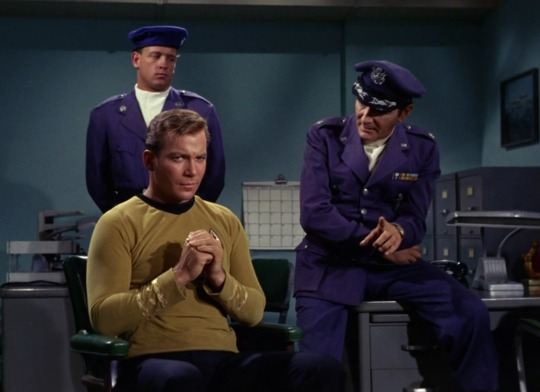
I do think it's interesting that the full scene includes not only Kirk's bisexual chaos gremlin diva genderfuckery (enrichment for him!) but moments of fear and defiance:
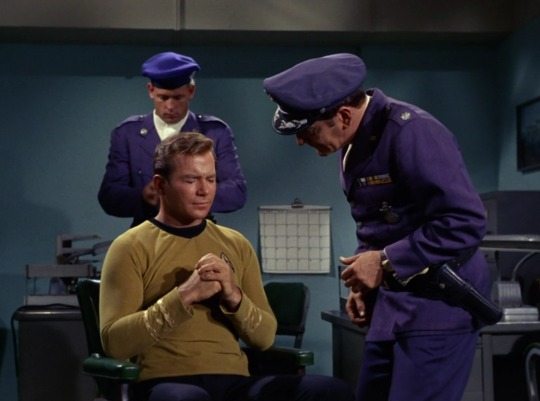
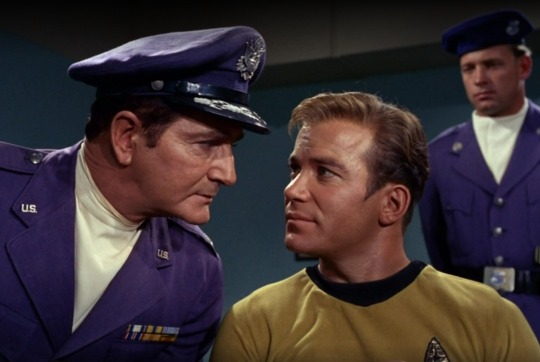
He doesn't drop the flamboyance until he wants to, though. And the framing, lighting, angles etc only serve to emphasize their attempts to loom even more over him, aggressively get into his space, gesture right at his face to unsettle him, and his refusal to be intimidated by these fundamentally pathetic responses that are by no means free from real danger, just silly and contemptible nevertheless. It's not that he's too disdainful or amused at his own hijinks to understand how easily this could go very wrong. He simply has no respect for these men and enjoys leveraging their own hang-ups against them.
His eye make-up is also more than usually noticeable in the close-ups in this scene—even compared to other scenes in the same episode—which seems maybe not unrelated!
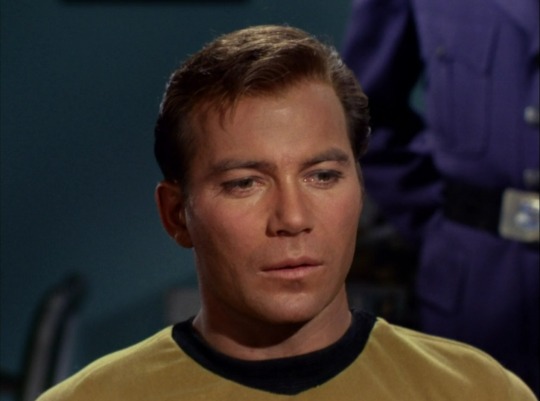
I think it's also worth pointing out that, TOS make-up aside, Kirk's navigation of gender performance in the original series is ... let's say, idiosyncratic. Most of the 23rd-century male characters are far more inflexible and singular about what gendered roles they're willing or able to inhabit. Kirk specifically is very deliberately fluid and versatile and theatrical about a lot of things, very much including gender performance and sexuality.
#there are other really intriguing kirk + gender episodes or scenes in tos but 'tomorrow is yesterday' and 'i mudd' are just#a truly aspirational degree of fucking with dudebro attempts to understand or predict or control him. like a wrecking ball of gender#anghraine babbles#long post#respuestas#nice things people say to me#c: who do i have to be#anghraine's pics#tos: s1#tos: tomorrow is yesterday#star trek: the original series#lgbtqia stuff#gender blogging#star peace
228 notes
·
View notes
Text
What is Mage Viktor doing?

So it turns out I do have a take on what's going on with Mage Viktor, why he's messing with timelines in the way he is, and what he hoped to achieve by bringing Jayce to the torment nexus dimension and then sending him back to his own timeline armed with facial hair, trauma, and the ruthless determination to somehow stop his own Viktor.
Of course this is just my own reading; there are many ways you can interpret the reveals of the final episode. But it's become my preferred reading because it makes Mage Viktor come off as absolutely BATSHIT. The apotheosis of all Viktor's best and worst qualities. As he would be.
First we gotta lay out some fundamental principles about how I understand Viktor that will inform this reading.
Viktor was never being controlled by the Hexcore. This deserves its own whole meta, but tl;dr, I think it is directly antithetical to the core themes of the show to think that Viktor wasn't making his own decisions all through s2.
Over and over again in Arcane, we see characters become "monsters" and do monstrous things, and every time the thematic point is that this is still the person you love. When Vi says that her sister is dead because she is Jinx now and when Jayce says "my partner died in this room" THEY ARE BOTH WRONG. The person they love is different now but they're still in there and they can still be reached.
Viktor is transformed by something terrible happening to him (like many characters in the show!) but all his decisions are still his own and to me they seem like perfectly consistent--if extreme--extensions of what we know about him as a character before he gets a Hexcore heart.
So my analysis starts with the premise that Mage Viktor is not trying to free his past self from an outside influence. He's trying to hack his own character traits to make a different version of himself do what he wants.
Viktor is BOTH genuinely altruistic and compassionate AND deeply arrogant. This is such a banger combination and I think turning down the dial on either trait makes Viktor less interesting. I think Mage Viktor has genuine remorse about what he did in his timeline and he is, fundamentally, trying to find a way he could have stopped himself from killing everyone (within certain constraints; we'll get to that). When Jayce is able to show main timeline Herald Viktor his memories of what Viktor is about to do to their world, the first thing Viktor sees is not dead Jayce, or himself left alone in an empty world. It's all the ordinary people who are going to die terrified because of him.




I do not think any version of Viktor wanted this result. But Viktor is so convinced he is always right that his arrogance carries him right past the point of no return before he realizes oh actually I haven't freed everybody I have killed them.
So I do think Mage Viktor is trying to find a timeline where this doesn't happen, but he is not timeline-hopping in order to preemptively stop other versions of himself from making the same mistake. If he wanted to do that, he would just leave all the many many timelines where Jayce dies in a blizzard as a child alone. No Jayce who grows up obsessed with magic, goes around Academy rules to get the hex crystals, invents Hextech and gives Viktor the power to fuck everything up. Easy peasy.
But no. Instead, Viktor is actively going into other timelines and changing them at the point where Jayce would have died.

He is doing things that appear to make the sequence of events that leads to his world-ending magic blast WAY MORE LIKELY. And that's because...
Viktor is obsessively selfish when it comes to Jayce.
Mage Viktor wants to find a timeline where he doesn't doom the world but not at the expense of meeting Jayce and spending years doing science with him.
If the goal was only to prevent Jayce from dying in the blizzard, he could have done it quietly, waiting for Jayce to collapse in the snow and then transporting him to the base of the mountain, leaving before Jayce had any idea who saved him. Instead he makes SUCH A DRAMATIC PRODUCTION of it that Jayce remembers and can repeat the steps of the action years later, well enough that he actually produces a working spell from a barely-tested Hextech prototype. Mage Viktor wants that shit burned into baby Jayce's brain. He wants to make sure he fundamentally alters the arc of Jayce's life, bending it into a trajectory that collides with his own.
Viktor also (as far as we see) doesn't go the route of going back in time and killing his younger self, or steering the course of his own life along a path where he never meets Jayce. He doesn't even go for a timeline where he and Jayce meet each other but they don't invent Hextech. Now maybe it's the case that some time before our Jayce arrives in his timeline, Mage Viktor tried all that, and has figured out that none of those options work. (Maybe in some of those timelines Jayce is the one who goes Machine Herald, and there's no partner there to talk him off the ledge of ending the world.) But I think it's also possible that, now that he's gotten the experience in one timeline of spending years with Jayce making once-in-a-generation scientific breakthroughs together (which I truly believe is just as important a part of their relationship to Viktor as any romantic or sexual element might be)...he can't bear to deny any version of himself the chance of having that--even if the price is the rest of the world. Because a world where Jayce isn't his partner isn't a world worth saving.
So what I think Mage Viktor is doing is sitting there with his stubborn engineer brain and the husk of his dead soulmate, fiddling with the timelines like a Rubik's cube, going Not meeting Jayce CANNOT be the only option. There MUST be a timeline where Jayce and I meet each other and entangle our lives in an alarmingly codependent way AND we dodge the apocalypse at the last minute, I don't end up killing him, and we do not doom the world together. And I'm going to fucking find it.
So he's been hitting timeline after timeline, trying to find the combination of factors where everything works. He is not trying to preemptively save every timeline from himself, he is trying to prove to himself that meeting the love of his life doesn't doom the entire fucking world. It's devotion that is SO PROFOUNDLY SELFISH that he is willing to doom timeline after timeline, but driven by someone with enough compassion and pride that he doesn't want the guilt and shame of knowing he can only have this one life-changing thing if he ruins everything else for everyone, and enough arrogance to still look at this as a problem he must be smart enough to solve.
At some point in this process, I think he also figures out that Jayce is the only person who has any chance of reasoning with any version of himself. I think it's worth paying attention to the exact wording of his "in all timelines, in all possibilities" speech, because it's not just a love confession (although it is that).
"I thought I could bring an end to the world's suffering. But when every equation was solved, all that remained were fields of dreamless solitude. There is no prize to perfection. Only an end to pursuit. In all timelines, in all possibilities, only you can show me this."
And while this is some hella romantic cosmic soulmate level shit, it is also Viktor saying I need you, because you are the only person I have ever trusted enough to save me from myself.
It's the Hexcore promise all over again. Viktor knew he couldn't destroy his own creation. I read this not as Viktor being physically unable to destroy it because the Hexcore had some power over him, but not having the will to destroy it. Because this huge leap in Hextech technology was his big breakthrough and not (as I think he saw it) him supporting Jayce's dream. He knew he couldn't do it. So he asked Jayce to do it for him. Please, save me from my own pride, my desire to leave a legacy. I can't do it on my own.
It's a huge extension of trust, for Viktor to admit such a need. And now he's doing it again when the stakes are MUCH MUCH higher. I need you, because you are the only person who can show me the horror of what I am about to do and have me believe it.
Of course, the deep irony is that really the only person Viktor trusts to tell him he is wrong is HIMSELF FROM THE FUTURE. Astral plane Machine Herald Viktor is standing right behind Jayce, watching Jayce's memory of Mage Viktor telling him what the consequences of his actions will be, and that is the moment the horror sinks in and cracks him fully out of his machine shell.



But of course Jayce is the only person he would ever trust enough to carry such a message (from himself!!) to somewhere close enough to reach him.
It's not clear exactly how much of a detailed plan Mage Viktor has when he sends Jayce back to the main timeline, or how much of that plan he shares with Jayce. But I think he has figured out some broad strokes which affect how Jayce behaves.
(1) Jayce has to immediately go and kill commune Viktor. Squishing Salo is maybe a bonus side quest, but Jayce doesn't even take time to fucking shower before he heads for the commune. (I would love to see the part of the conversation where Mage Viktor is like yeah you know that pit you just climbed out of? Yeah the first thing you gotta do is go right back in there, all the way to the bottom, and find me looking like ethereal cyborg Jesus and blast a fucking hole through my chest.) Maybe this is because if Jayce waits around at all, commune Viktor finds a way to get to him and he folds and joins the cult. Maybe this is because there are just fewer variables involved in forcing Viktor to speedrun his own villain arc by Jayce repeatedly turning him down in one "perfect" form after another. Maybe Mage Viktor knows himself well enough to realize "yeah if you say no to me even ONE TIME but ESPECIALLY when you are HOT and SUFFERING I will go fucking apeshit and we can use that to our advantage."
(2) I think Mage Viktor has realized that he can only be stopped at the very very VERY last minute. He has to be able to see the direct line between what he is about to do right now and the arcane-blasted hell world he's about to create. Otherwise his ego will get in the way and tell him he is smart enough to figure out a way to somehow not kill everybody. Yeah Mage Viktor fucked that one up obviously, but I, main timeline Viktor, will be smart enough and well-intentioned enough when the time comes to simply not do that. I think this is why, for example, Jayce doesn't go to the commune trying to get Viktor to see the error of his ways. It won't work until it is allllmost too late.
Main timeline Viktor stops literally seconds before the point of no return. The arcane corruption spikes that we see everywhere in Mage Viktor's world are already starting to appear.

I think Mage Viktor knows that Jayce has to let him get right up to the edge, close enough to be looking over into the abyss, before he'll be able to pull him back.
But he knows Jayce can do that. That's what they do for each other, right?


This is why I think it was always the plan for Jayce to fight him all the way to the top of the Hexgate, and then surrender. Jayce has to survive until the end of the fight, and maybe for magical physics reasons he has to wait until Viktor sends the anomaly into the sky above the Hexgate. But once they get to the top of the Hexgate tower he stops trying to fight Viktor altogether. Maybe Mage Viktor told him exactly when it had to happen or maybe he just realizes this is the exact same place where he died in Mage Viktor's world; this is his last chance. But in any case, Jayce lands on the top of the Hexgate on his knees and he doesn't try to get up.

He waits, and when he senses Viktor behind him he doesn't try to fight or run away.



I think he knows, either because Mage Viktor told him or through his own intuition, that he has to let Viktor pull him into the astral plane if he wants a chance at reaching him.
How exactly he was going to get through to him and/or get close enough to share the memories before Viktor assimilated him...ehhhh I don't know if either of them had that figured out. The "you were never broken" part of Jayce's speech, while important from a character perspective...very crucially DOES NOT WORK. IT DOES NOT WORK AT ALL. Viktor is assimilating Jayce the whole time. You can see Jayce's astral body changing from the unique version that's still him (like his hands on the left, when he first enters the astral plane--which still look more or less human even though Viktor has already erased "imperfections" like the scrapes and cuts from his time in the pit and the arcane corruption that's spreading up and down his arm from where the rune is embedded) into a featureless gold blob like the other assimilated people.


You can watch the gold light creeping up his body steadily during those lines until it reaches his eyes.



The ONLY thing that stops this timeline from ending the same way Mage Viktor's does...is EKKO.

I think you can make the case that Mage Viktor sent Ekko to the no-Hextech timeline intentionally. But it is such a complex chain of causality for Ekko to get to the point where he's chucking a time machine at Herald Viktor's face that there is no way anyone--even a remorseful demigod with lots of time on his hands--could control every possible factor.
However elaborate Mage Viktor's plan was, and however determined Jayce was to keep his promise to him, it all would have failed if not for factors outside their control and random fucking chance.
Arcane is FULL of near-misses and what-could-have-beens and characters who are trying their best to do something getting knocked off course by consequences they never could have foreseen. Season 2 in particular introduces a persistent thread of chaos and the sense that even events that have understandable root causes are now spiraling out of characters' control. So it feels fitting that such a moment factors into the show's ending.
This is Jayce right before Ekko blasts through spacetime right above Viktor's head.


Yeah that guy was cooked.
The only thing that stops Jayce from being assimilated is Ekko breaking time to throw the Z drive at Viktor's face.

Which startles Viktor enough that he takes his hand off Jayce's head in the physical realm (ETA at first I thought it looked like he did, but upon closer rewatch I don't think their physical connection ever breaks; the assimilation link in the astral plane does though), and also breaks a piece of his machine mask off in the astral realm.


As he always does when one of his "perfect" bodies gets damaged, Viktor withdraws and tried to hide, enough that he lets go of the assimilation connection with Jayce.

Jayce starts to regain his own identity/autonomy.

And he gets a do-over. Exactly the same way Ekko used the Z drive to get a do-over with Jinx when he was trying to talk her out of suicide. Jayce gets another chance, and that's when he goes for "all I want is my partner back" and "because I promised you." Which works.
Mage Viktor's plan, I think, was for Jayce to help main timeline Viktor realize what he was doing before it was too late, and then give him the runestone, which allows him to release all the minds/souls that are connected to him before this becomes some runaway chain reaction of arcane power that swallows everything around him. (How the runestone does this exactly, and how the anomalies play into it, is stuff I am still thinking about. But tbh I am less concerned with the details of made-up magic physics than I am with the character beats.) Mage Viktor had accepted that main timeline Viktor was probably going to die in this process and he'd made peace with it. That's what "should" have happened anyway, if Viktor never found a way to forestall his illness, right? As long as this Viktor got to spend the best years of his life with his Jayce, it was okay.
I don't think Mage Viktor ever expected Jayce to stay there until the end. His goal was to save the world and spare Jayce from himself. And why would he plan otherwise? We know why Jayce stays, but Mage Viktor never got that part of the story. He schlorped up his own Jayce's consciousness with everyone else and maybe he only understood the depths of what Jayce felt for him in the moment that he was killing him. And main timeline Viktor certainly does not expect Jayce to stay. He's shocked when he realizes Jayce has no intention of leaving. No, that wasn't part of any master plan. That part was all Jayce.
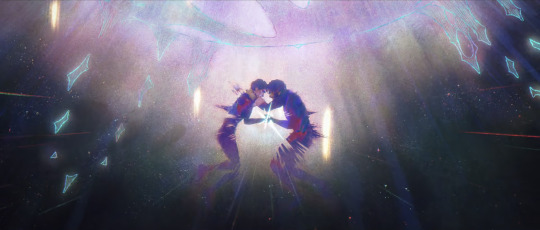
#arcane#character analysis#viktor arcane#jayce talis#ekko#mage viktor#wizard viktor#arcane meta#jayvik#long post#seriously jesus fuck SO fucking long#i hit the image limit for the first time ever i think
484 notes
·
View notes
Text
it's hard to find more stories with protagonists like Vash because most similar ones have a crucial difference: age.
Protagonists that act like Vash (loud, goofy, fun) are usually young, naive, intense. Full of grand resolve. Almost inevitably they'll end up in a crisis of disillusionment, a loss of innocence, as they gain life experience and begin to understand the complexities of the world. There are a lot of coming of age themes. Journey of discovery.
Vash has already passed that phase. He's been hurt, he's been disillusioned, betrayed, wronged, humiliated. In the present day of the story when things don't play out according to his ideals he doesn't experience a crisis of belief, he just wearily adds it to the pile of his perceived failures that he carries with him. Yes, it hurts, but in the end it's just another scar and he's used to those.
He's used to all this.
When he's absolute forced into a conflict of ideals (looking at you Legato) it breaks him. And I don't think he really grows from the experience. Not like a young protagonist. I don't think July or anything else made him resolve to do better in some deep profound way. He just ends up gritting his teeth and getting back to what he was doing before. Just now with extra Guilt(TM).
Not that he doesn't grow and change at all. It's just fundamentally different from a teenage character who's always having huge life-changing revelations and learning important lessons.
When the plot hits Vash it's not about him learning, it's about him planting his feet and refusing to budge for any reason. The only way to move him is to break him. And after he breaks he pieces himself back together and returns to stand in the very same spot to do it all over again.
With a goofy gin on his face.
Which is basically the end of the manga, now I come to think of it.
(usual disclaimer: this is me thinking out loud and trying to sort out my vague ideas and order them into some form of coherent statement. Your mileage may vary about my success)
#trigun#a dozen sporks speaks#it's always like I'm on to something but I can't get past the rough draft of my thoughts
238 notes
·
View notes
Text
Some Notes on Mydei's Characterization (Part 2)

<- Part 1 is back this way.
I hit the tumblr image limit way before I ran out of things to say about Mydei, so here is the second half of the notes I've been collecting on his characterization. As always, interpretations are my own.
6. Mydei Both Embodies and Challenges Nikador's Virtues
We know that Mydei is regarded, by characters in the game at least, as the perfect avatar for Strife. Repeatedly, the game parallels Mydei and Nikador, and throughout our journey in 3.0 with Gnaeus, we're supposed to see the similarities between his aloof but noble behavior and Mydei's belief that violence without honor is nothing but meaningless slaughter. Obviously the undying king with powers literally based on the spilled blood of legions would be a good match for the warrior god whose conquest plucked the sun out of the sky... (Although I do like the recent discussions I've seen of there being mismatches between the Chrysos Heirs and the titans, hmm.)
But though Mydei reveres Nikador as his people's god, at the same time, he actually reviles what Nikador has come to represent, quintessentially rejecting the the central tenants of his own people's faith. Even as he recognizes the inevitability of the prophecy, Mydei is unwilling to accept the coreflame because he sees his own identity as diametrically opposed to Kremnos's conception of Strife. Mydei doesn't want to become what Strife means for his people; he does not feel fit to be Strife's demigod because he understands that doing so will mean losing himself, a person who is fundamentally different from the Nikador of Amphoreus's current timeline.
So the game is simultaneously telling us that Mydei is a great parallel to Nikador and a terrible parallel to Nikador, and it achieves this interesting contradiction by deliberately examining Nikador's five core traits in comparison to Mydei, who both exemplifies those traits and defies them.
According to the Kremnoans, the five virtues of Nikador are:
Unfearing of blade at the throat, manifesting the visage of courage
Unyielding to conniving treachery, protecting the crown of honor
Unblinking of eyes burning bright, upholding the cornerstone of reason
Unbending from wounds to flesh, forging characters of tenacity
Undaunted of risking life to protect, embodying corpus of sacrifice
Taking only the key concepts--courage, honor, reason, tenacity, and sacrifice--it should be abundantly clear how closely Mydei hews to these virtues and how they've informed his character arc so far, but I think it's particularly interesting: Mydei's story also intentionally refutes the traditional Kremnoan interpretations of those virtues.
I'll talk more about sacrifice later, but the other virtues are very apparent:
"Unfearing of the Blade at the Throat"

I barely have to say anything, do I? I doubt there's anyone who would question Mydei's courage given what we see in from 3.0 to 3.1. Without flinching, Mydei was willing to plunge into single combat against Nikador, despite knowing that he would almost certainly die a countless number of times while trying to hold the god off. Even knowing that Phainon was literally losing his mind in Nikador's coreflame trial, Mydei was willing to jump into the trial himself to save Phainon, again without a single ounce of hesitation. Mydei has lived a life where he has constantly faced death head on, where he has needed to stand up against impossible odds over and over again.
Clearly, he fully embodies the classic Kremnoan notion of charging into battle without wavering, of never backing down from the challenge, and of never shying away, even when loss is imminent. On the surface, we can easily say that Mydei parallels Nikador in this manner, and that Mydei gracefully fulfills his people's expectations for a leader to be absolutely undaunted in combat.
But then the game takes another track and tells us that Mydei is not only what he seems on the surface. With direct confirmation, the game tells us that Mydei is not fearless.

In fact, he's flat out terrified--not of combat, but of history. He is frightened of his own authority, of the responsibility he bears toward others, of choice that has been left in his hands. He is afraid of making the wrong choice, and for both 3.0 and 3.1, we see him do the exact thing a Kremnoan king--an embodiment of Strife--should never do: he wavers. Multiple characters criticize him for this hesitance, even Phainon, who jokingly scoffs at the idea of Mydei breaking his people's traditions, only to backpedal when he realizes Mydei is serious.
The conclusion of Mydei's arc in 3.1 is not the trial with Nikador. It's not Mydei's becoming a demigod. It's not Mydei's battle with Flame Reaver. It's Mydei finally making up his mind and committing both himself and the Kremnoan people to the dead opposite path expected of a blood-stained conquering nation. Mydei's definition of courage directly opposes the traditional Kremnoan definition, and therefore also opposes their interpretation of Nikador's "unfearing" virtue.
Rather than charging into battle without flinching--Mydei's courage demands the Kremnoans surrender the fight instead. Instead of dying, now they have to live. This is what makes it so fascinating that Krateros actually reacts to Mydei's brand of courage with terror:

Kremnoans know how to throw their lives away without hesitation. But asking them to embrace peace? Change? To survive? They are unprepared and entirely out of their realm of experience.
Mydei's courage parallels Nikador's--but also utterly inverts it.
"Unbending from Wounds of Flesh"
Tenacity, too, should be very obvious. Of course Mydei fits the traditional Kremnoan interpretation to a T--he takes every hit and stands right back up again. Very little needs to be said about Mydei's willingness to keep going even if it kills him, then to come back swinging even after dying. In the eyes of the traditional Kremnoan people, who could possibly be a better example of tenacity than someone whose body can't even be stopped by death itself?
The implication of the original Kremnoan virtue, linking tenacity to being "unbending from wounds," is that physicality is what matters. Before all else, to be able to battle without ceasing is the aspiration, while other aspects of the soul, other elements necessary for meaningful lives, are left under-developed or entirely eschewed. You keep going into battle or you might as well not keep going at all.
But Mydei once again challenges this notion, as his character revolves around a central conflict whose answer is "peace"--he doesn't want the Kremnoans to have to show the type of tenacity they most ferociously believe in. Like Mydei's courageous decision to lead his people away from their own faith, Mydei's actual tenacity appears most clearly in his ability to face Amphoreus's cruel world with empathy.

Given everything he has experienced in his life, Mydei is the character in Amphoreus who has the most right to be jaded, to believe that people are inherently cruel, that nothing in their dying world can be improved, and that there's no meaning to life other than to suffer. He was murdered by his father who also murdered the mother who loved him. He suffered ten thousand deaths drifting miserably in the abyss of the Sea of Souls, entirely alone--yet he clung tenaciously to that life that promised nothing but more suffering, dragged himself free of that hell and kept going. He embraced friendship and found himself a family, only to lose every tiny shred of joy he had cobbled together for himself as they died in front of him in horrific ways, one after another. He became the crown prince of a fallen kingdom, leading refugees into a city that hated and mistreated them for years while he served as fodder for battle, all while knowing that his own ultimate fate would be to surrender his remaining humanity to become an avatar for calamity, ensuring his own future would nothing but endless pain and loneliness.
The man had absolutely nothing to live for (except for the fact he can't die, I guess), but instead of surrendering to despair, he's the one joining in on the Flame-Chase Journey, telling Aglaea that he admires her most because she managed to light the flame of hope in people--even in him.
Knowing that only more suffering lies ahead of him, Mydei still ferociously embraces the life he's been given and the heavy honor he bears in guiding others on the right path. Rather than just racing mindlessly into battle, again and again into the same cycle of conquest, Mydei's truest example of tenacity is his ability to "take the first step," moving forward mentally and emotionally toward the future he dreams of for his people.

"Unyielding to Conniving Trickery"
Just as with all of Nikador's other virtues, Mydei clearly embodies the traditional Kremnoan definition of honor: He's honest, straightforward, and reviles those who use trickery to achieve their goals. To that end, we can see his act of patricide as the ultimate example of Mydei upholding the very classic Kremnoan definition of honor, killing a conniving schemer, his father Eurypon, to avenge an honorable warrior, his mother Gorgo.
Yet even as he accomplishes what he views as a necessary act--a duty to his mother's memory--Mydei does not react to the deed as other Kremnoans expect. Krateros rejoices at Mydei's decision to kill his father, but Mydei's only response is silence. Later, as I mentioned above, he discusses the pursuit of vengeance with Phainon and warns Phainon that revenge can never bring joy or closure.
In the ruins of Castrum Kremnos, when Phainon and Mydei debate the intersection of honor in combat, Mydei at first challenges Phainon's soft-hearted view with the traditional Kremnoan definition--but then, when Phainon claims that Mydei doesn't believe in his own people's tenets--Mydei remains silent again, tacitly agreeing with the truth Phainon has revealed.

Mydei is a deeply honorable character. Certainly the Kremnoans would have no scruples saying that about him, if only his surface actions are considered. Yet at his core, Mydei's definition of honor ultimately rejects everything the Kremnoans stand for, seeing absolutely no meaning in their pointless battles or their excuses for bringing harm upon others. Recognizing that nothing is truly gained even during the most justifiable of killings, Mydei's own sense of honor makes all of Kremnos's sacred history look like nothing but a record of historic evils.
"Unblinking of Eyes Burning Bright"
"Reason" is the virtue missing from Nikador, the one that up and wanders away while the Black Tide moves in. We're introduced to Nikador's reason as an entire embodied concept through Gnaeus. Through Castorice's interactions with Gnaeus, we're led to believe that Nikador was once fair and just, capable of staying his blade in respect of worthy opponents and of discerning the schemes of lesser men. The virtue, in the classical Kremnoan interpretation, seems to lie in being judicious, in knowing when to strike to always secure victory.

Mydei, of course, is not an unreasonable person. (He's more reasonable than the cranky/tsundere stereotypes he gets in fandom, anyway lol.) As I mentioned in the first part of this post, when Phainon wants to go charge straight into fight Nikador, it's Mydei who demonstrates this virtue of reason, reminding Phainon that they simply don't have the resources to tackle the fight. In 3.1, it's Mydei who reasons out what is going on in the first coreflame trial and determines how to solve their issue, find Phainon, and safely escape. Tactically, Mydei clearly demonstrates the ability to keep up with his opponents' moves, strategically divide forces, and see through enemy bluffs. By all accounts, he's a perfect picture of traditional Kremnoan "reason" too.
Yet, once again, Mydei's particular sense of reason puts him at odds with Kremnoan beliefs--because he is smart enough to see the bigger picture. What does victory in one, two, three battles mean? What does winning one war mean, if the next war is already on the horizon? What purpose does dying in noble combat even serve in a world that is already ending? Mydei applies his reason not to the short-sighted conquest of prior Kremnoans but to the longer view of the future, recognizing the futility and inevitability of the rise and fall of nations. For this clear view of history, Krateros warns Mydei that the ultimate consequence of his own intelligence will only be more suffering for him:

Like Nikador's reason standing alone, Mydei's reason sets him entirely outside the Kremnoan faith, causing him to recognize the inherent failings of a cultural system of wasteful violence enforced for over a thousand years. Looking at his own people with a discerning eye, Mydei ends up accidentally separating himself entirely from the familiar confines of his people and their traditions--like Gnaeus, struggling but unable to return to the whole.
On the surface, Mydei represents an excellent embodiment of classical Kremnoan virtues. As Eurypon says in the Kremnos flashback, Mydei bears the seeds of all of Nikador's virtues, stepping unflinching into battle, refusing to surrender in the face of death, approaching every duel with honor, and knowing when and where to strike. But at every turn, he also rejects and exceeds the confines of his people's interpretations of those virtues, using courage to stop battles rather than start them, tenacity to take the first step on a journey toward a more peaceful future, honor to reject the cruelty of Kremnos's callous views on death, and reason to grasp the broader context of making meaning in a dying world.
Mydei should be understood, at his core, as a character of extreme contradictions--both the "most and least Kremnoan of them all." Examining the way his character parallels while also wildly deviates from Nikador's perfectly encapsulates the core conflict of Mydei's character arc, the place where who the world expects him to be--crown prince of Kremnos, demigod of Strife--clashes directly with who he wants to be--the revolutionary remembered for freeing his people from despair into a true "Era Nova" of hope.
7. The Person Who Matters Least to Mydei is Mydei
Okay, so wait--what about "sacrifice"? It almost goes without saying, but I left the last virtue to its own point because "sacrifice" is the single most important trait of Mydei's character.
This is true in two entirely different ways: Mydei's life and philosophy were shaped almost single-handedly by the sacrifices of others--first, by his mother fighting to the death in an attempt to avenge him, and then by the sacrifices of each of his five friends in turn, who died insisting that Mydei should live on in their place. Knowing of his mother's sacrifice and witnessing his friends' deaths were clearly the life-altering experiences driving Mydei's departure from the Kremnoan faith.

Even as he tried to fulfill his friends' wishes by taking up his place as the crown prince of Kremnos, it's from these losses that Mydei truly learned the meaningless of the central tenet of Kremnoan belief, "valorous death before glorious return." There was nothing valorous in the deaths Mydei was forced to watch--the people he loved died pointlessly, fighting essentially for a cause and nation that had already rejected them. By watching everyone he cared for sacrifice themselves on the altar of Kremnoan ideology, he--the sole survivor, the one always, always left behind--was forced to confront the real reality of a culture that chooses to romanticize death, that hinges self-worth on a willingness to kill and be killed, that exists entirely as a war machine dependent on its ability to bring pain and suffering to others.
Even as he loved Kremnos for being the nation to birth him, the nation to embrace him, and the nation to need him--I think Mydei must have hated Castrum Kremnos in equal measure. This, I think is core to understanding Mydei's relationship with his own self-identity as Kremnos's prince: He loved what Kremnos could have been, while despising what it had become.
In the sacrifices of his comrades, Mydei found the very opposite cause his friends expected of him--he found his will to tear down their entire nation's thousands-year-old system of wasteful bloodshed.
But, another contradiction: While hating the sacrifices others were willing to make for him, Mydei has also proven himself to be an exceedingly, unflinchingly giving person. There is no aspect of himself, his own happiness, or his own freedom that Mydeimos is not willing to sacrifice if it means protecting the people, the land, and the world. If by giving something of himself, he can improve the lives of those who deserve it, Mydei will always choose to take the suffering of others on himself.
We see this selflessly giving nature from his earliest memories. His first character story impresses that even from his time as a tiny child, he was willing to aid others with no thought of reward, at his own expense even, helping drowning fisherman make it to safety but never seeming to be able to make it out of the Sea of Souls himself. By 3.0, we're told that Mydei and the Kremnoan detachment had become Aglaea's blade, carrying the brunt of Okhema's battle against the Black Tide and the raving titankin. Despite the fact that Mydei has reservations about Aglaea's orders, he follows them essentially without question, even when he knows this will put him at risk of pain and death:

But 3.1, of course, is what truly hammers the extent of Mydei's self-sacrificial behavior home. In 3.0, we see Mydei flat out refuse the coreflame of Strife several times. Mission text for the game tells us that he has "an absurd extent of hesitation and objection to accepting the god's authority," but Mydei also insists repeatedly that his hesitation doesn't have to do with worrying about himself. Instead, he says that his only hesitation is his people. Whether this is true... more in a second, but for now:

Mydei does not want to accept his destiny to become the demigod of Strife because he fears it will bring harm to those he cares for, the Kremnoan people he has fought for and died (many times) to protect. He is afraid he will perpetuate the exact same cycle of needless violence he despises if he loses his self-identity to the soul of Strife. He is, he claims, perfectly willing to sacrifice his humanity and self-identity as "Mydei" to become "Amphoreus's Guardian"--but only if he can do so while still ensuring a real future for the Kremnoans. Sure, this seems like a noble goal, but in all of this, there is no talk of Mydei's life, Mydei's freedom, or Mydei's dreams. It is only ever "what is best for the Kremnoan people" and "what is best for Amphoreus."
In essence: What Mydei wants does not matter, because Mydei's only spoken concern is the needs of other people.
For me as a fan of this character, the first half of 3.1 was viscerally discomforting. As players, we have the oh-so-pleasant privilege of starting 3.1 watching Mydei be systematically manipulated into sacrificing his own autonomy. I absolutely love Aglaea and Tribbie, but I won't sugarcoat it: by word and action, both of Okhema's demigods knowingly stripped Mydei of his agency:
First, Aglaea insults and pressures Mydei, calling him foolhardy and essentially suggesting that if Amphoreus falls, it's going to be because of Mydei's indecision. She essentially drops the responsibility for all of Amphoreus on his shoulders:

Then, Mydei confronts Tribbie about the even harsher truth, that both Aglaea and Tribbie had knowingly gambled with Phainon's life strictly to push Mydei into that corner:

Yet even after all this, even knowing that Aglaea and Tribbie have just doomed him to an end in pain and misery, what does Mydei say? "I have no intention of condemning you for it." He knows the meaning of the Flame-Chase Journey and understands that his autonomy was never going to stand up to the prophecy. He just lost every hope he might have had of living the life he dreamed of--and what does he still say? "It's okay. I don't blame you." Goddamn Mydei, won't you stand up for yourself at least a little?
Then we get to watch Mydei grow desperate. His freedom and future are already bought and sold. He knows he's running out of time, and he still hasn't found a way to protect the people who are relying on him. He practically begs Krateros to help turn the Kremnoans away from their path of bloodshed, and what does he get from the closest thing he ever had to a father figure?
A extremely cutting guilt trip, and, maybe even worse, a thinly veiled threat to withhold regard:

This might as well be a father saying "You have disappointed me."
Mydei has no one to turn to in these early scenes. Again, not a shipping post, but his only genuine ally, Phainon, isn't here to be his back up, leading to scene after scene where Mydei is treated like fate's chew toy. Players get to watch every single character who is indebted Mydei for his service and who has every reason to respect his wishes instead turn on him and push him into doing things he doesn't want to do.
(Okay, I'm lying, this is a little bit of a shipping post: I can't help but laugh, because the plot of mid-3.1 is literally "Phainon comes back for one scene and almost single-handedly solves Mydei's central character conflict by sending him to talk to Chartonus." He really said "I gotchu, man." 😂)
In Mydei's final goodbye to Castorice, we even see this unhesitating self-sacrificial nature when Mydei thoughtlessly offers to let Castorice kill him just so he can help with her own goal of pursuing Thanatos. Castorice is quick to rebuke him because, unlike Mydei, who has come to view his uncountable number of lives as nothing but currency to be spent in service to others, Castorice desperately values life. She chides him for being so willing to sacrifice himself, but he basically deflects, claiming it's an aspect of all Kremnoans rather than reconciling with the fact that, by this point, he's basically given up on trying to have any regard for himself.

In the end, Mydei manages to find his way forward, making the final, devastating difficult call to dissolve the dynasty and end the history of Castrum Kremnos. This is framed as Mydei reclaiming his agency, making the choice that he knows is right over the choice everyone expects of him. This is what Mydei wants for his people.

But what is the final outcome here for Mydei? The Kremnoans staying safe in the holy city wasn't Krateros's wish, nor the detachment's wish--it wasn't even the young Kremnoan children's wishes to stay in Okhema. It was Mydei's wish to live peacefully in Okhema with those he cares about, finally free of the shadow of Kremnos's bloodstained history and the madness of the path of Strife.
The life that Mydei secured for the Kremnoans is the life he dreamed of living.
And now the only Kremnoan who doesn't get to live that dream is Mydei.
Mydei went to Castrum Kremnos knowing he would likely never return. He went knowing his own death was already signed and underlined in future records of history, either at the hands of enemies from the Black Tide or at the hands of the person he trusted his deepest secret to. He knew that he would spend the rest of his life alone, engaged in the very same endless war he wanted to stop, the strife he did everything to spare his people from.
He sacrificed his own humanity, his entire life--everything he fought to claim as his own--all to protect other people. (I.... love this character so much...)
Nikador's last virtue is sacrifice. If you want to understand Mydei's character, just remember: Mydei is the kind of person willing to sacrifice everything he has.
8. But the Fact that "Mydei" Exists Means Something
Okay, but with all of that said, the true tragedy of Mydei's story is that he wasn't completely selfless. If he genuinely had no thoughts for himself and lived only for the happiness of others, his actions in 3.1 wouldn't be framed as a sacrifice in the first place.
Mydei's decision was difficult, and his ultimate departure was saddening, because he did have some regard for his own life. Mydei had dreams that didn't involve becoming the demigod of Strife. There were things Mydei was looking for in the world that now he will never get the chance to find.
And nothing more clearly tells players this than the existence of the name "Mydei."

Unfortunately, the effect of Mydei's name change is a little bit lost from the original Chinese to English: In Chinese, while "Mydeimos" is the same as in English (Màidémósī/迈德谟斯), "Mydei" is actually "Wàndí" (万敌), functionally an entirely different name. This works in Chinese because the use of specific characters allows the meaning of the name to stay the same (the "My" in Mydeimos means "ten thousand" and so does "万") while the sound of the name changes noticeably. In English, just using an abbreviation doesn't have quite the same effect unfortunately, but obviously the English translators didn't have the same options.
Anyway, the point is that in the original text, Mydei didn't just ask the Chrysos Heirs to use a nickname; he literally gave them an entirely different name--almost an entirely different identity. This distinction is reflected in his very first voice line, where he introduces himself as both "Mydeimos, the crown prince of Castrum Kremnos, and Mydei, the warrior of Okhema," as if these are two different people.
Mydei was essentially inventing a different life for himself, a life where he didn't have to be a prince but instead could be just a regular warrior, where he wasn't "of Castrum Kremnos" but "of Okhema."
At the end of 3.1, Mydei's return to Castrum Kremnos is framed as "returning home." The mission description suggests this, and when Mydei returns to Castrum Kremnos, he's greeted by his mother's voice and answers her turn.
But this is actually bittersweet, because the game tells us repeatedly that Mydei has deeply conflicted feelings over whether to think of Castrum Kremnos as his home. In 3.0, Phainon insists that Mydei must be feeling extreme homesickness while exploring the ruins of Castrum Kremnos, but Mydei's conflicting backstories make it unclear whether he ever truly lived in Castrum Kremnos as a child.
Then, in 3.1, Mydei's scene with the children is obviously meant to be an evocative parallel. The children insist that Kremnos is their home, but Mydei pauses and asks them: "Can a place you've never seen be called your home?" This scene is important, because it is clearly intended to parallel Mydei's own situation. Most characters in the story--including all the Kremnoans--view Castrum Kremnos as Mydei's home, but he was thrown into the sea from the time he was an infant. Even if he returned to Kremnos after that, it could only have been under a false name, hiding his existence from his father the king. Is he himself holding on to the notion of Kremnos less for what it is and more for what he feels it's supposed to mean to him? Merely because of tradition and history? Was Castrum Kremnos ever really his home, or has Mydei's home always been the people he loves?
When Castorice asks him if he's returning home at the end of 3.1, Mydei struggles to answer the question, making it clear that he doesn't truly believe that Castrum Kremnos is his home anymore:

But if Kremnos isn't his home, then where is? (Oh, you wandering lion...)
I'd like to point out that Mydei's "About Self" line isn't "About Self: Castrum Kremnos." It's "About Self: Holy City." In this voice line, he expresses his surprise about the new life he managed to create in Okhema, how he never would have dreamed of ending up there as their ally one day. But in the same breath, he laments that "Okhema cannot be a home for everyone," because, as he discusses later in his "Annoyances" voice line: "Castrum Kremnos and Okhema have long been at odds. A spear can pierce the enemy king, but it cannot resolve the deep grudges of the people." Mydei is vexed by the barrier between the Kremnoans and the Okhemans because he doesn't want his two nations to be at odds. He wants Okhema to be a welcoming place for the Kremnoans--himself included.
The game tells us that Mydei was a person who was looking for a home, and that he wanted Okhema to be that home.
Mydei admits to Phainon that he is (they both are) naive, always wanting the best for everyone:

What Mydei believed was "the best for everyone" was a peaceful place. A place his people could prosper, a place where they could live on without needlessly wasting their lives on the battlefield, where, like the Mountain-Dwellers pushed from their homes in Chartonus's story, there would at least be a future for the Kremnoans that wasn't just "valorous death."
But Mydei wanted all that for himself too.
In "As I've Written," the author writes that Okhema was the final gift Mydei gave to his people--but in doing so, he had to sacrifice the chance to keep Okhema as a home for himself.

Mydeimos was willing to make the ultimate sacrifice for his people without hesitating. He was willing to throw himself into danger over and over again, even when it would kill him painfully numerous times. He was willing to face his deepest fear and take on the coreflame of Strife to protect Amphoreus, despite knowing that the cost would be his personal happiness and freedom. He did so almost entirely without regard for his own life, unwavering in his sense of duty to others.
But the existence of "Mydei" meant something: a small, secret wish for a different future, to become someone who could live freely in a world without meaningless, endless violence, unchained from the evernight at last, surrounded by the people he cared for and who cared for him in turn.
Many people are worried for the numerous death flags surrounding our favorite prince... but the truth is that "Mydei" is already dead. That hoped-for life died the moment Mydeimos accepted the coreflame of Strife and surrendered his humanity, the moment he returned to the empty darkness of a fallen kingdom, where only a throne of blood was waiting, bidding farewell to any dream he ever had for a softer future.

9. Deeply Affected by Okhema's Discrimination
All right, that was bad. So you know what I'm going to do now? Make it worse.
I truly believe that part of the reason Mydei did not fight harder against his fate is that, even as he made his decree telling all the other Kremnoans to stay in Okhema and adapt to their ways... He didn't know how to do that himself. Even as he wanted to make Okhema his new home, he didn't know how to make the holy city accept him. (He probably doesn't know how to make himself feel at home anywhere, really.)
"As I've Written" says that cruel rumors followed him everywhere he went in Okhema, even though he never raised a hand against anyone in the city:

His voice line "Annoyances" suggests that Mydei is frustrated that he could kill what was likely one of Okhema's greatest enemies, Eurypon, and yet still the city would not forgive the grudges of the past. In 3.0, one of Mydei's first lines to Phainon is to remind him that Okhemans and Kremnoans still don't get along, even as he also says "I'm not in a place where I'm free to change that."
In 3.1, we see that despite serving the city faithfully as frontline soldiers for years, dying for Okhema's cause, the Kremnoans are still so mistrusted that the Council orders higher ranking members like Krateros to be placed under surveillance. In 3.0, the Kremnoan NPC Aeleus basically ends up running off from Okhema (to his implied death) simply because the Okhemans would not accept his relationship with one of their own. At the very beginning of 3.0, one of Phainon's first lines is chiding Mydei for not protecting "Okhema's citizens," but the way the line is framed accidentally excludes Mydei from being counted among those citizens, something which Mydei calls Phainon out for.
In 3.1, what the Kremnoan children tell Mydei is pretty devastating: they're being ostracized so badly, they can't even think of the place where they were born as their home.

At the end of 3.1, Mydei is even shocked to see that people other than the Kremnoans have come to see him off, seeming genuinely surprised that any of the Okhemans would respect him enough to want to say goodbye.
Even more telling, Mydei's own allies, his fellow Chrysos Heirs, admit that they've completely neglected the situation of the Kremnoans, turning a blind eye to the discrimination and hardships Mydei's people have been facing for years.

But all of this really culminates in the first coreflame trial. Although I've seen lots of people talking about how Mydei's fear was losing his friends, including Phainon, I think a lot of people kind of blanked over the fact that Mydei didn't just fear losing his friends--he specifically feared that his people would become the victims of hate crimes. The entire setting of the first trial for Mydei was watching the Okhemans turn on the Kremnoans, hurling slander and literally beating Kremnoans to death in the streets.

(This last one was particularly harsh, as Mydei clearly holds Chartonus in high regard--seeing someone he cares for act frightened of him and tell him there's no place for him in Okhema clearly shook Mydei even more than seeing the shade of Perdikkas die again.)
Mydei confirms for Tribbie that in Nikador's trial, he saw his "greatest fear," something that "terrified him." But Mydei wasn't just frightened of losing his friends--if it was only losing his friends that he feared, then like Phainon was, he would have been transported to the past and relived their real deaths. Instead, we specifically see a new fear: Mydei is terrified of Okhema's xenophobia, terrified that his people (and himself) will eventually be entirely rejected, losing their last refuge in a dying world.
Part of Mydei's greatest fear is the belief that no one wants him, that there is no place in Amphoreus for the "beast spurned by all."
This, of course, makes Tribbie's comment about how she and Aglaea have sidelined the Kremnoans' concerns all the worse--while treating him as a friend and ally, the Chrysos Heirs seem to have largely failed to do anything to address the prejudice Mydei was facing. In fact, we even see this mirrored in the bath scene later; yes, it's light-hearted but also, in the broader context, it isn't the greatest of looks: Even though Phainon is obviously being dumb, everyone automatically believes Phainon when he pins the blame on Mydei, and they confront Mydei as if the whole thing were his fault.

Mydei is an incredibly resilient and enduring person. He has faced the entire world as his enemy and still come out on the side of good. He certainly would not allow the opinions of plebeians to sway him. Nothing others could say or do would force him to bow his head.
But... I don't think Mydei was as immune to Okhema's discrimination as he liked to seem. The fact that he created an entire new name for himself, that he swore his loyalty to Aglaea and kept every promise he made to Okhema and the Chrysos Heirs, and yet still couldn't find a way to make Okhema his home... The fact that dream he had for his people's future was essentially for them to be able to live the exact same lives the Okhemans already do, in peace and prosperity, and yet even while living among them for years, the Kremnoans hadn't been able to reach that level of comfort... The fact that his last wish to Phainon was for him to be the bridge to finally help the Kremnoans adapt to life in their new nation...
Phainon's comments about what happened to the Mountain-Dwellers after they left their homes almost seemed to suggest that he fully understood the dangers of the action Mydei had just taken--like the Mountain-Dwellers, committing the Kremnoans to a future in Okhema does mean exposing them to further prejudice and mistreatment. Mydei accepts this as fact, suggesting that he knows just how much his people might suffer from the choice forcing them adapt to a foreign culture's expectations. And yet Mydei excluded himself from that need, and now will likely never--in this life at least--have the opportunity to grow to fit the place he expects his people to one day call home.
The fact that so much of Mydei's story revolves around this conflict between the two halves of his life, his two nations, suggests that this issue did affect him significantly, likely for years. I think it is actually one of the key reasons Mydei struggled so severely with his decision over the Kremnoans' future--and over his own future. If Okhema had accepted Mydei with open arms, treated him with respect and affection, if the holy city had given him a real home for possibly the first time... I don't think the story would be where it is now. Mydei was so willing to give up his own life and freedom at least in part because he felt like he had no other options, and some of that feeling certainly comes from believing he had no place in Okhema. Mydei was convinced that the other Kremnoans would eventually adapt and be accepted by the Okhemans, but I don't believe he ever thought that acceptance would apply to him.
It wasn't just the prophecy that drove Mydei away to Castrum Kremnos.
I think Mydei's character should be best understood as someone who, even while refusing to ever give in to the hurtful comments and behavior of others, was at least very much aware of, and shaped by, years of discrimination for beliefs he didn't even hold.
10. Stranger Danger/"I Won't Say I'm in Love~"
All right, with those wonderfully depressing points out of the way, why don't I end with some comedic relief? There's one last thing I want to say about Mydei's characterization:
He's kind of shy.
😂😂😂Okay, okay, I'm kidding. Mydei isn't actually shy by the average definition of shy folks (nervous, struggling to assert themselves, cracking under the slightest scrutiny). Mydei isn't going to ever make himself smaller or run away when someone tries to approach him, of course not.
But Mydei is reserved. It seems that he does not usually befriend people easily, is slow to trust, and keeps himself aloof, particularly among those he doesn't know well. It's easy to see this in the flashback from early on in Phainon and Mydei's acquaintance, where his responses to the conversation are exceptionally stand-offish, devolving into just one-word answers to try to free himself from the awkward small talk with a stranger.

One of the places people are most likely to find Mydei in Okhema is withdrawn, keeping to himself all the way up on the farthest corner of the roof. He even flat out asks why the Trailblazer would ignore his obvious wish for alone time. Even in 3.1, when taking a photo with the Trailblazer, Mydei is pretty awkward about it, saying that he doesn't take photos often, which suggests that he doesn't put himself out there much, even on Okhema's World Wound Web. (Maybe he's just hiding behind his cute chimera tiktoks instead; I am a Fig Stew truther lol.)
But I think perhaps the funniest indicator of Mydei's reserved nature are the scenes in Castrum Kremnos in 3.0. Although the Trailblazer is obviously not the most talkative character in Star Rail, Mydei goes almost that entire sequence without speaking more than a single sentence directly to the Trailblazer. Literally, the only line of cutscene dialogue he says to the Trailblazer for an entire two hour sequence of the patch is "Think what you want." Every other line in the entire Castrum Kremnos sequence is instead spoken to Phainon; sometimes he even speaks about the Trailblazer but goes right over Trailblazer's head to talk to them through the medium of Phainon.
Even Mydei's voice lines start with bare bones, one-word answers; his greeting to the Trailblazer is just "Mhm," despite clearly having no issues speaking full sentences to people he knows better.
Mydei really said "I don't talk to strangers."
Which, honestly? Totally fair of him. When you're an exile from your homeland which is ruled by a king who tried to kill you and every single other surviving nation on the planet hates your guts, it's not like a lot of the strangers you meet are going to end up being friendly. Mydei has obvious reasons to be aloof and to withhold his thoughts from people until he's certain he can trust them. He even has reasons to not be that well adjusted; the first nine years of his life were spent with virtually no human contact, and then even after that, he was taken in by the Kremnoan exiles who were already predisposed to support him no matter what his ability to connect with others was like. It's perfectly understandable for Mydei to not be the most talented social speaker and to tend to keep to himself.
But it's also just so humorous in practice--an undying prince of a conquering nation, one of the lead warriors of Okhema, rife with the pride of Castrum Kremnos, refined in both body and manner... And he's just awkward with people he doesn't know well. As much as it might be influenced by a tragic past, it's also a charm point.
Hell, Mydei's a little bit awkward even with people he does know well, at least when it comes to trying to express himself. Of course, the bath scene is the best example of this. Mydei comes up with literally five different options for things to say to Phainon and then ultimately scraps them all because "None of those sound right." (What he goes with in the end honestly isn't any better lol.)

Mydei was clearly trying his best to find the correct words, and the fact that he hesitated over picking the "right" answer tells us that he's not always as confident in communicating with others as he might initially come across. He's not just trying to come up with the first thing possible--he's trying to find the right thing to say because he is considerate and invested in in being understood by those he actually cares about. Krateros accuses Mydei of using words alone to try to end the Kremnoan dynasty, but the truth is that if Mydei were better at expressing himself--more eloquent and more persuasive--he likely would have faced less opposition for his beliefs.
When characterizing Mydei, I think he reads very much as the kind of person who can say the exact right thing in the exact right moment when it comes to, say, earth-shattering duels with the gods--the kind of person who can speak with poise if there's a challenging political or martial situation afoot. But in closer settings? In those personal conversations where he can't assume a distant, military commander stance and fall back on the expected answers of a warrior prince? The places where what he says really matters, emotionally, to the person on the other side? A lot tougher battlefield.
I think Mydei really is someone who comes across as distinctly reserved--not always because he's aloof or untrusting, but because sometimes he just doesn't know what to say or how to say the things he's feeling and thinking. It's cute, okay?
And you know what else is cute?
It's true that Mydei isn't classically shy, but his marketing has shown us that there is one scenario that he absolutely can't handle: Mydei can't even hear the word "romance" without getting flustered. (The gap moe is so, so real; I am not immune to your propaganda, Hoyo...)
In the 3.1 special program, just the rumor that Nikador once had amorous feelings is enough to leave Mydei stuttering, and in his weibo animation, when the "princess" demands that Mydei act charming, he completely falls apart, so much that he can't even get the sentences out straight and blurs them into a nonsensical mess.

Mydei, fistfighting a god: For me, it was Tuesday.
Mydei, being asked on a date: This is how it ends.
I know it's popular to make jokes about Mydei having his harem, but honestly, if just hearing the word "pretty" makes him panic, I'm not sure how he would ever have managed it. 🤣
Of course, this gets even funnier when we remember that Mydei is also the male character who most consistently brings up talks about emotions and the importance of recognizing and embracing them, who chides Phainon for trying to hide his sadness during their goodbye, and who casually drops half of Amphoreus's most romantic lines. Mr. "If there's chance in the next life, you should come visit my library" can't handle "Do you wanna dance together?"
Make of all this what you will; I don't have a deeper meta analysis of this that wouldn't be better put in a ship post, but in terms of characterization, I think the way Mydei communicates, struggles to communicate, and the places where his communication completely breaks down are all great indicators of the overall person the dev team was trying to convey:
Someone who cares for other people, even more than he cares for himself, but who still, and perhaps always, longed to find a place to belong, loved ones to come home to, and those who will listen to both the words he says and the ones he can't quite get out.
Mydei isn't a brawn over brains brute whose temper pops off every single time he gets mildly annoyed, or someone who lives his whole life in the training arena and takes every chance he can to start petty arguments. He isn't especially grumpy, machismo, or repressing his feelings, even when he's not always capable of realizing just how justified those feelings are. He's not unnecessarily aggressive or particularly rash, and he's definitely not dumb muscle. He is self-sacrificial to a fault...
But he is also a character of true extremes, combining an incredible capacity for violence with a longing for peace, a desire to do his duty to others while still wanting to keep something for himself, a pragmatist who understood the futility of fighting fate while still, deep down, harboring the idealized dream of a kinder future. He is the one who always asks to talk, but also struggles to find the right words; the one who embodies every tenet of his people's faith, only to reject everything that faith stood for.
Mydeimos, the crown prince of Castrum Kremnos, and Mydei, just the warrior of Okhema.
The man that you are. ❤️
One of my favorite Star Rail characters, beyond a doubt.
#honkai star rail#mydei#mydeimos#character analysis#hsr meta#amphoreus meta#so when do I get to start legally calling myself a top ten Mydei fan?#tiny bit of#phaidei#coding here#tagging so people who have the ship blocked won't have to see it#take my labor of love#I sacrificed sleep for this#I also ran a 101 fever the entire time I was writing this#because I got sick with the flu right after starting it#so if anything sounds weird#my excuse is that I was higher than a kite on over-dosed cold meds#don't @ me
352 notes
·
View notes
Text
i'm struggling to put into words exactly what it is that bothers me about eddie and buck's plot in this episode. i see what people are saying in that this fits with eddie's behavior when he's been at rock bottom, so i guess character assassination isn't the right term. i'm still shocked he put his hands on buck, and for far less provocation and less reason to be irrational than when chim fully punched buck. but, whatever.
my biggest problem is with the structuring. this isn't mad men or sopranos. firefam is allowed to be flawed but they're all supposed to be fundamentally good people that we're meant to root for. if they do something objectively shitty, the episode is supposed to have them make up for it by the end or put their actions in a different light. imo they failed at that tonight.
buck had done absolutely nothing wrong, was in fact doing his best to look out for the others while barely keeping his head above water. he was not shown being annoying or intrusive. just visibly sad (to the point where his voice sounded different. ostark the actor that you are). the only people showing appreciation for his feelings up to this point have been maddie a week before the funeral and tommy when it all went it down, and there's no indication that buck even knows he saw him which makes me want to scream.
eddie and hen seemed to care what was going on with buck, in a mainly casual, jokey way, and hen seemed more concerned about the impact of eddie returning to el paso on buck than his grief over bobby.
anyway the next thing we know eddie is going the fuck off on buck, just ripping him to absolute shreds about his self-centeredness while crying about how no one understands his pain and then lowkey blaming buck for not saving bobby. horrifying. this is us made an entire arc out of kevin saying that to randall, estranging them for like a year before they made peace. not that i expect or want 911 to be this is us. i'm just saying. they took it really fucking far. they did not have to. and eddie's sole accountability was "somebody was being a dick to you" before letting his child and his recovering aunt deal with nurturing buck.
that was not enough to get me back on board, show. not nearly enough.
#911 spoilers#911 critical#911 discourse#b's posts#i was supposed to be packing!#and they've got me ranting like it's elementary season 2 again fuck off
287 notes
·
View notes
Text
My Top 10 Batgirl (2000) Moments
This is my list of top 10 Batgirl (2000) moments!! There were so many to choose from, but these are my personal favs :)). Counting down from 10 to my absolute favourite.
10. Volving
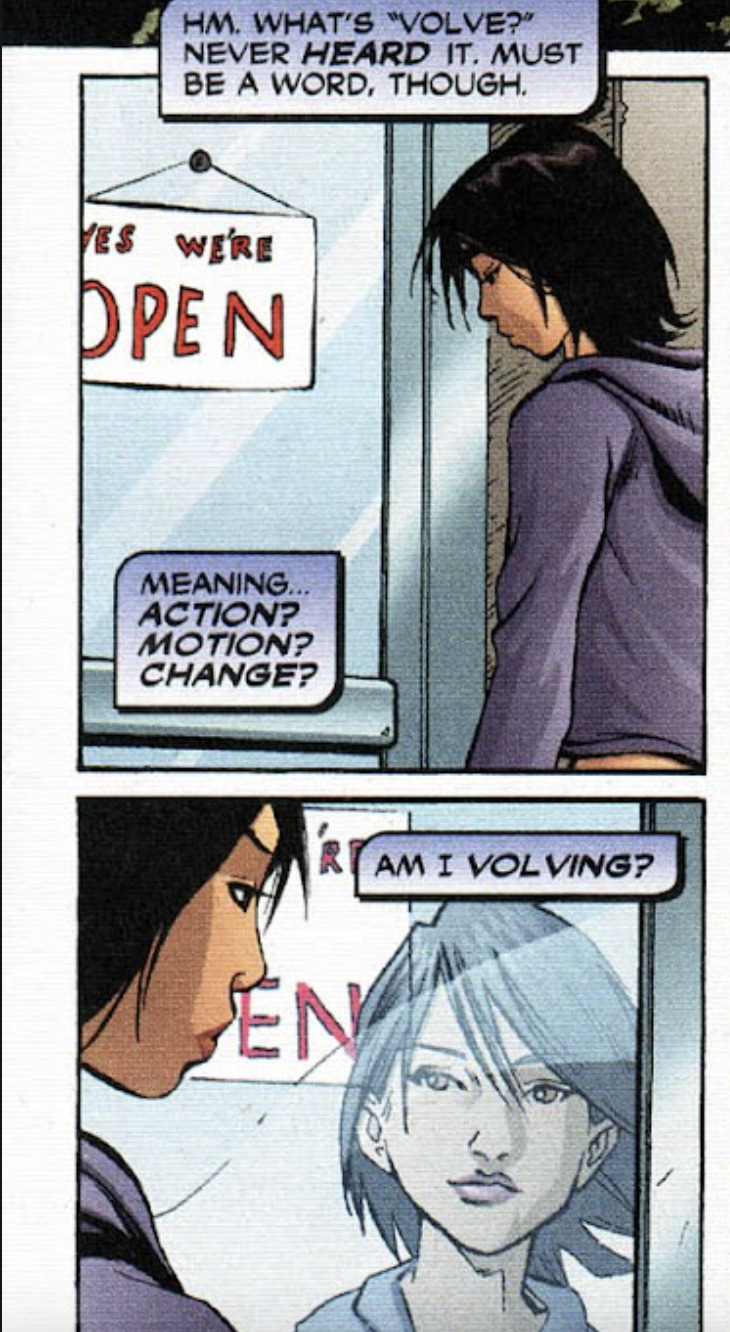
An absolute classic. Perfectly encapsulates what Cass does throughout the entire run, and more writers should play with Cass' use of language like this!
9. Beat Up Every Mob In Gotham

Perfect encapsulation of the early Barbara-Cass dynamic, and one of the funniest moments in the series. Just love the expressions and the way this shows so much of Cass' character.
8. Choosing to Write
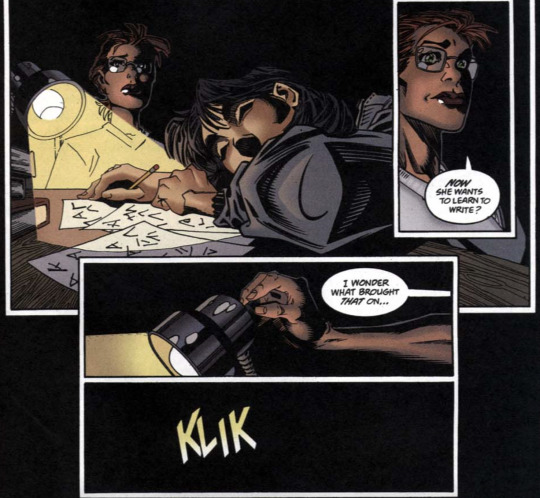
The entirety of issue #2 builds up to this heart-wrenching moment. After delivering a dead man's final message to his wife, Cass sees the wife's reaction to the written message and decides to learn to write. A foundational moment for her character, and a nice motherly Babs scene too.
7. Alpha Redemption
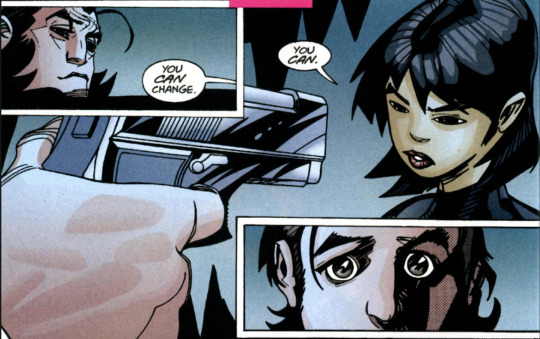
Capping off issues 35 + 36, Batgirl unmasks herself to convince Alpha (an amnesiac villain) that he doesn't have to be defined by his past. Brilliantly displays her core belief that people can change, and the fact that her belief pays off makes this moment extremely moving.
6. For God's Sake
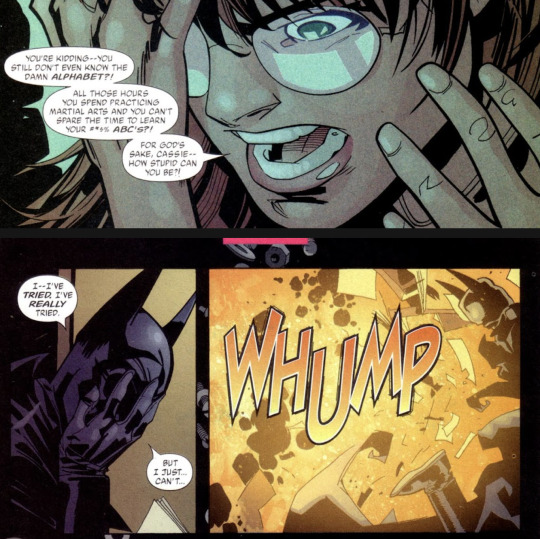
Possibly a controversial pick, but I really like this moment because it underscores some of the fundamental conflict between Babs and Cass. They love each other, but they don't always understand each other, particularly in regards to each other's disabilities. A painful moment that should have been explored more.
5. Fight For Your Life

My favourite Stephanie and Cass moment in this run. You can feel Cass' grief throughout this hallucination, but there's also so much hope and love (for Stephanie and for herself). It's an amazing conclusion to Cass' initial suicidal tendencies: instead of desiring death, she now actively fights to live.
4. Darknight Detectives

This interaction sums up a lot of Bruce and Cass' best moments. Cass' unwavering moral beliefs, Bruce's pride, their instinctive understanding of each other; they just get each other in a way few others do. I picked this one instead of the 'instinct/good answer' moment because it also marks Cass' development in her detective ability. From Moment 8 above to here, the confidence in her mental capacities has grown so much. She really volved!
3. Perfect For A Year
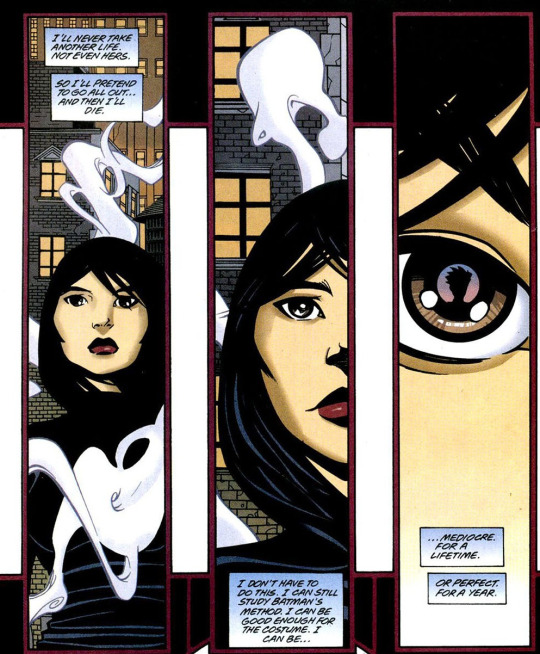
I mean of course this had to be here. These lines literally take up 90% of my brain space, it's an incredibly tense moment that illustrates Cass' desire to be perfect, her need to be useful and good. This issue is also just awesome.
2. You're... Not
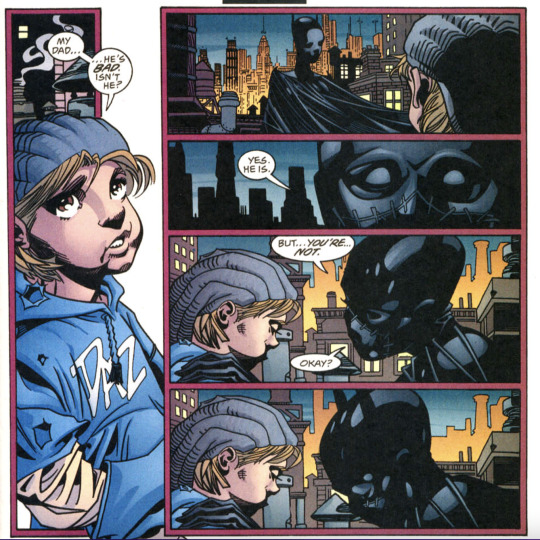
Another absolute classic. Illustrates Cass' compassion and her belief that people aren't defined by their lineage, which is particularly personal to her, given her own dad. This struggle between good/bad, parent/child defines many of Cass' best stories.
1. Who Do You Think You Are? + Father's Day
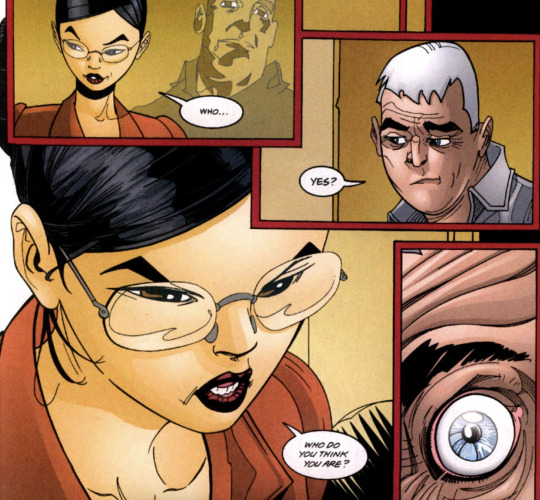
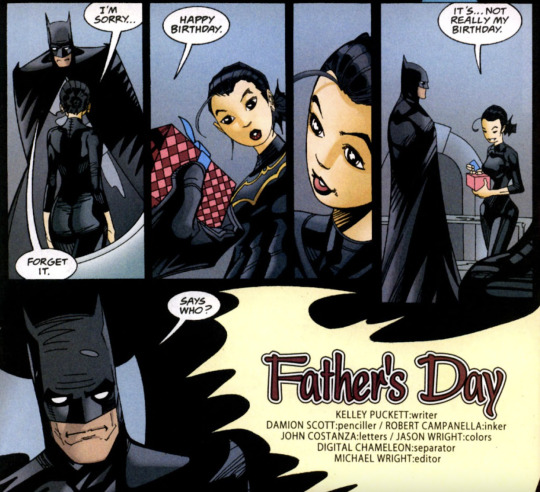
What else would number 1 be?? Issue 33 is my favourite in the entire run, and the entire thing is stacked with moments that could fill up this list. I just love 'who do you think you are' because it's all of Cass' rage spilling out, and yet she still loves David Cain in her own complicated way (and he reciprocates, too). Then we have the ending, which is the BEST Bruce and Cass moment ever. The sparse, meaningful dialogue, the expressions, the reveal of the TITLE: comic book writing at its finest.
Honorary mention to the Shiva/Cass fight, which just narrowly missed out.
#cassandra cain#batman#batgirl#everyone should read batgirl (2000) right now#barbara gordon#stephanie brown#bruce wayne
913 notes
·
View notes
Text
WHY ASTRID'S CHANGES IN THE LIVE ACTION HURT HICCSTRID
Very long post ahead.
I will be VERY real rn. I am a very hardcore Hiccstrid shipper but I HATE stupid pointless fanservice. And in the LA, there’s so much and at that point in the story is really dumb… It fundamentally changes what made them great in HTTYD1, Especially Astrid.
I talked about it here in my Astrid review, but the way those two scenes in particular misunderstood their core dynamic which SHOULD BE ALLIES FIRST AND THEN ROMANCE.
Their scenes felt just so weird to me. Hiccup is an utter simp and not in the good way… He lets Astrid be even meaner to him. Astrid herself feels so much meaner while getting her OG ending is jarring. She legit threatened him to take his house like hello?! Why would she ever say that? Besides the obviously stupid decision to make her want to be Chief out of nowhere and super OOC, making her hate him for being “privileged” adds such an inconsistent and horrible layer to their “romance”. Cause now Hiccup just takes it… Hiccup may have been weak and meek at first but he was NEVER a pushover. And Astrid having a new "motivation" to hate him is a misunderstanding of her character.
Astrid saying "He's never where he should be"
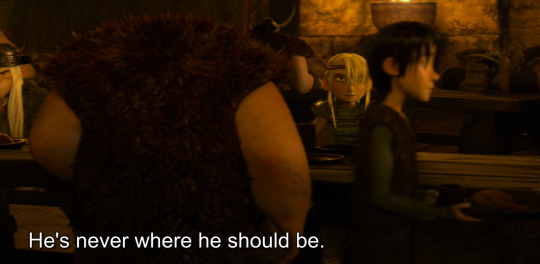
is very important, cause this shows how Astrid really sees Hiccup at first. Someone that is not VIKING LIKE and is a nuisance. He SHOULD be viking like but he isn't, he's not doing what he's supposed to be and he's not really trying in dragon training at that point. Astrid's disliking of Hiccup stemmed STRICTLY from the fact that Hiccup didn't take his position as Berk's future seriously, she just wanted to protect her village and Hiccup was clearly a liability WITH HIS INVENTIONS that caused more harm than good and THAT'S why he was looked down upon, NOT BECAUSE HE WAS PRIVILEGED. It's SUCH a pointless and dumb change that EVEN IF Astrid came from nothing as she said in LA, it would still make no sense. Now listen, THIS LINE right here could potentially mean that Hiccup being cut some slack could be related to being the chief's son, YES. I'm not saying that Hiccup didn't get special treatment by Stoick cause if it was anyone else? Stoick probably would shipped them off a long time ago. But understanding why Hiccup was there has more to do with the fact that Gobber insisted to Stoick, and the more he got older, the more he needed to protect himself somehow. Putting Hiccup in training is something that would've happened sooner or latter whether he liked it or not. Hiccup's arc was never about "humbling" himself or "recognize his privileges" he was bullied because he was weak and non viking ffs like PLEASE stay focused... Him being the Chief's son was never an actual point of contention for Astrid OR the gang.
Pointing out the real reasons Astrid hated him is very important cause she left him well enough alone for the most part even tho she was mildly annoyed he was a liability to their safety (which is what Astrid cared more about, "Our parent's war") stuff started changing AFTER his success, cause Astrid is prideful yes, she wants to be the best warrior, in her core she's still human and she did get jealous Hiccup of ALL PEOPLE started winning cause of UNUSUAL UNVIKING LIKE methods.
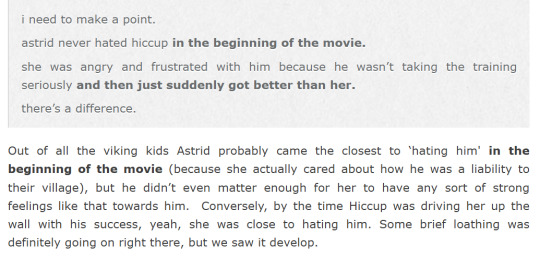
Their added scenes in the Book of Dragons and in the Kill Ring absolutely make my blood boil. Not all new Hiccstrid scenes are good just because they’re Hiccstrid.
In Book of Dragons LA scene, he’s actively insisting on Astrid that dragons may be good when at that point in the story he was NOT SURE HIMSELF YET. In the OG Hiccup was ALWAYS VERY cautious. This added scene is so weird to me because yes, why would Astrid listen to him? AND threaten him?
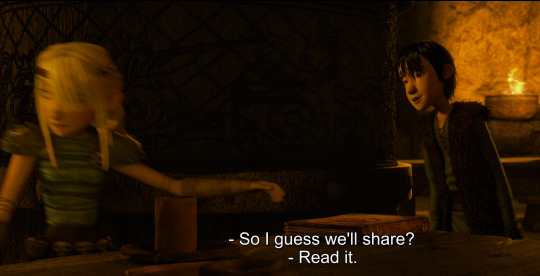
The fact is that Astrid in HTTYD1 left Hiccup well enough alone because she really didn’t care about him until after he started “cheating” in her eyes. They skipped the forge scene where that point is driven further:
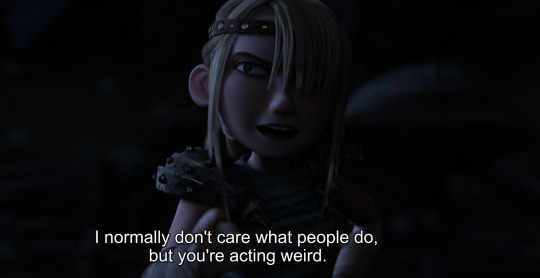
“I normally don’t care what people do but you’re acting weird”
Astrid being sus of Hiccup is important because she NEVER CARED for him at first and THEN she started to notice that he was acting weird. And with GOOD REASON, unlike everyone else, Astrid didn't look for the easy way out, EVER. Astrid was methodical, logical and yes viking-like aggression when fighting but most of all FAIR. She EARNED her place and she wanted Hiccup to do the same. She may have not seen a new way yet, but at that point in the story, the methods Hiccup was using might as well have been cheating.
Cause yeah, “No one just GETS as good as you (Hiccup) do, especially you (Hiccup)” "Are you training with someone?" She could sense that Hiccup was getting better out of NOWHERE and his methods were clearly... dishonest for lack of a better word in her POV. like we KNOW that isn't true in Hiccup and the Audience POV since WE know what's happening, but SHE doesn't. She followed Hiccup around for weeks and he was acting super sus and evading questions, clearly hiding something. That alone made her fume. Like Hiccup being an Astrid simp the whole movie is just so... superficial. At first we KNOW he was shooting his shot but LATER, AFTER TOOTHLESS, he's mostly nervous around her because SHE WAS ABOUT TO FIND OUT HIS SECRET, his priorities change. He's focused on a far more important thing.
HICCSTRID AS ALLIES FIRST
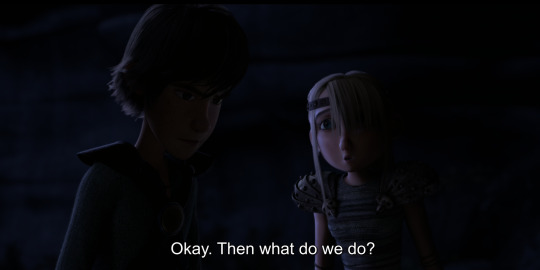
As I talked here, The Cove scene is so much more deep and important to Astrid becoming an ALLY to Hiccup first. She realized that she needs to protect Toothless.
That's why in the Kill Ring LA scene, I got so angry when they BOTH completely forget about HIM and they make it about ASTRID and her reputation and I absolutely HATED their new dialogue. Astrid didn't need to VERBALIZE she was going to support Hiccup. I don't know if they are allergic to subtlety but her saying "I will be with you whatever may come" was already a given in the last scene. SHE was the one that asked Hiccup "What do WE do?"
And something that DID make my blood boil is how Hiccup cared MORE about Astrid's reputation and her relationship with Stoick (something that was not even shown before even in the LA movie) OVER TOOTHLESS SAFETY?! No. Just no. THIS is cheap ass simping fanservice and I hate it. WHY would Hiccup care about Astrid's reputation in THIS VERY MOMENT? When he's about to expose himself to the whole village about dragons? Why did he suddenly forget he's doing this because of TOOTHLESS and his discoveries about dragons and making the world peaceful?? It also doesn't help that we didn't even SEE a scene with Stoick and Astrid together, it was just TOLD to us that suddenly Stoick always wanted a girl? and that he adores Astrid?? like? show not tell... great. And then because we don't even see a single scene with Astrid and Stoick in the LA, when Stoick suddenly gets super mad at Astrid for helping Hiccup, he's like "AND YOU!" pointing at her, like? why you mad bro? why do u feel betrayed? as if you had ANY interactions with her... but I digress...
What actually happened:
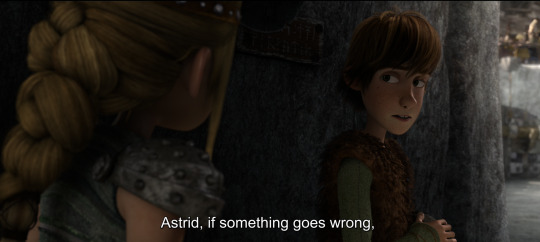

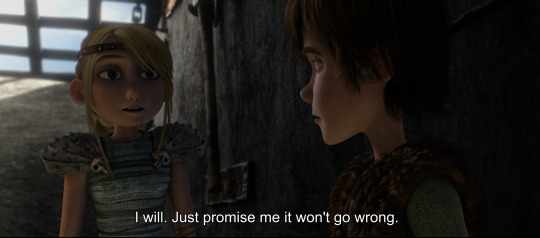
THIS right here, has MORE MEANING than Hiccup wanting to "protect her reputation" and not wanting her to get involved in the LA?? like? again, why would he say that here and not the previous Cove scene when she said she was going to support you? Why make this dumb change in the worst time possible?
Skipping these lines to me is criminal to the FOUNDATION that is their relationship. Both Hiccup and Astrid in the first movie are very interesting in the sense that them becoming allies to me is far more important for the plot than them being a couple. The very base of their relationship SHOULD BE protection of their people and dragons and how THAT is the what aligns them both. I don't want to have changes on their characters if it means romance (and this goes for RTTE as well cause I do NOT like a lot of what they did with Hiccstrid there), that's not why I ship them, it's because they work so GOOD as allies FIRST.
Removing this dialogue that is SO POWERFUL undermines so much not only Hiccup's relationship with Toothless but also Astrid's actual ROLE as an ally. Astrid is not a good ally because she's a die hard for Hiccup at that moment, she's a good ally because she's ALSO protecting Toothless AND WILLING TO DO WHAT IT TAKES AS WELL to protect him in case anything goes wrong. And because her being the very FIRST one to changed her mind, her support is super important to Hiccup- THAT'S why he stayed, NOT because he has a crush on Astrid or viceversa.
Hiccup needed an ally FIRST, not a girlfriend. He was completely alone, he was about to leave, and Astrid being the first one, regardless of if he had or not a crush on her, is valuable to him because he not only admired her but he respected her. She was the model viking, and if he can change her, he can try to change everyone else now that he has backup. Sure he liked Astrid but romance is not in his priority list, especially after Toothless, and quite frankly, it wasn't on Astrid's priority list either. What unites them first and foremost is their drive to protect, and once Astrid saw that in Hiccup, she saw a new side of him; not the weak nerd that messed up and didn't seem to care about being a proper viking, but a protector, which is what made her respect him.
Hiccstrid as a ship is very very fun to explore and analyse but when u actually take into account WHY they started that way and why they work... The Live Action not only changes Astrid but in consequence it changes Hiccup and Astrid's relationship and what makes them good, and to me THAT is what suffers the most in their dynamic. All their scenes to me felt so weird and with 0 build up and chemistry. I don't like fanservice if it has to change the characters for them to work... I HATE Hiccstrid fanservice because in the LA it gives them MUCH more focus than Hiccup and Toothless's actual bond, and the Kill Ring scene is the proof. And god how I hated that dialogue... I don't want them to be putting Hiccstrid above what makes HTTYD great and that is HICCUP AND TOOTHLESS'S BOND. PERIOD. (Something rtte and httyd3 also suffer for btw but that discussion is for another day)
Hiccstrid is great yes, not only because of how they started but because of what they became. I truly appreciate their friendship and ally-ship so much. I love a LOT of their romance and I think it's actually really mature, so it pains me to see ppl reduce it to its bare minimum...
#Oh Astrid... you suffered the most here.#Cause MEN DONT KNOW HOW TO WRITE WOMEN YEYYYYYY#yet again...#i thought I saw the worst of you in rtte#but somehow they manage to keep lowering the bar....#httyd#how to train your dragon#httyd live action#httyd live action criticism#astrid hofferson#astrid#Hiccup#hiccstrid#hiccup haddock#httyd talk#httyd meta#httyd analysis#astrid's character
125 notes
·
View notes
Text
Jaheira is Not a Deadbeat
I am, as always, deeply in love with the kids' ambient dialogue while waiting for Jaheira to come inside. And it's time for me to have Opinions.
FIG: I saw her! I swear! RION: Are you sure? Maybe it was just a laborer holding a shaggy grey mop! FIG: Be serious, Rion! Who puts braids on a mop?
FIG: She'll be here any second. Maybe she's sneaking! RION: Doubtful. We'd hear her knees cracking.
And of course my favorite:
RION: Enough, Fig. There's no point getting your hopes up. She'll be back when she's back. FIG: You don't think she will! RION: I know she will. But we'll wait a little longer, if you like.
😭😭😭😭
Rion absolutely knew perfectly well what she was supposed to do from Jaheira's instructions. She just didn't want to. She's been hanging on to the desperate belief that Jaheira was going to walk through the door and make it unnecessary - and, as it turned out, she was right.
OK, fuck it, I'm doing a post about this now. :P

Despite what the Tumblr BG3 fandom would have you believe, Jaheira is not a "deadbeat mom." Is she a parent with emotional constipation issues and way too much time at work? Sure. But so are plenty of other parents on both Toril and Earth. It's SUPER clear from the way all the kids (including Rion) talk to and about her that they LOVE her and she has been an enduring presence in their lives, and that her recent disappearance was both unusual and devastating.

There are books she reads the kids up in the bedroom! Fig is so excited to announce she's back, indicating that the absence is not a normal occurrence! Jhessem has convinced herself they share a bloodline! Jord got to go to the market with her as a boy! These are not the circumstances of children who do not give a shit about their parent or vice versa!

The devnotes about Jord’s conversation in particular do not show a picture of a man with ill-will towards a mother who felt it customary to abandon him:
JORD: I tended to it. I just let it... thrive in its own independence. You know, same way you raised us. (Devnote: Well meant potshot at his mother, no malice in it) JAHEIRA: I raised you to be a sweet and kind boy. What happened? JORD: I watched what you did instead of listening to what you said. (Devnote: Amused, gently mocking his mother) JORD: This house has taken in a lot of children over the years. Mother dear was sometimes more commander than, well... mother dear. (Devnote: Smiling, explaining why he and Jaheira trade barbs. No criticism, just understated affection)
It is, perhaps, worth noting at this point as well that Jord - and Rion, and Fig, and even Jhessem - speak with that teasing, mocking tone towards Jaheira… but so does she - towards the people she cares most about, including you as the player. The kids are acting as they have learned, and words like this can and should easily be read as gestures of affection. And they clearly trust Jaheira enough to bring this playful rudeness to the fore without fear of it being misconstrued or turning into hostility.
And if they are like Jaheira in this way, they’re also not going to be comfortable showing the real depth of their feelings in front of you, the player character - who is fundamentally a stranger who has just walked into their house. Why would they? Jaheira clearly doesn’t; indeed, even her more serious conversation with Rion only takes place outside where even the other children aren’t listening.
Perhaps most significantly, I truly don’t understand how anyone can interact with Tate for even a moment and think that Jaheira does not have a deep, if often unspoken, bond with the kids she raises:


JAHEIRA: I hope you were hibernating, little cub, I can’t think of another reason you wouldn’t come down to say hello. TATE: Jaheira! I d-didn’t… didn’t w-want to see if you were r-really dead. They said… JAHEIRA: Who said? TATE: Jord and Rion. They didn’t think I c-could hear… JAHEIRA: You little sneak-thief. Well, they were wrong. Look! Not dead! I just… had a few adventures.
She is so soft and gentle with him in a way that she is with no one else, a way that indicates that she knows him and how his personality is different from the others. And he in turn has clearly been utterly devastated by the idea that she might be gone.

Take, as well, the evidence provided by Minsc when he is present in these conversations! There’s plenty of evidence to indicate the degree to which Minsc is guided by Jaheira’s behavior - to the degree that a doppelganger wearing her face was the key ingredient to binding him temporarily into the Cult of the Absolute. And Minsc - far more comfortable with emotion than Jaheira, at least in some ways - is clearly very affectionate with the kids as well:
FIG: STAND ON YOUR LIVER! MINSC: It is stand and *deliver*, little Fig. Though I think I like yours better. You bellow like a true berserker!
JHESSEM: A fine day to you, saer. Are you known to this court PLAYER: Eh? JHESSEM: Ugh - play along, would you? MINSC: Lord Boo is most pleased to make your acquaintance, my lady! Word of your grace has spread far and wide among the hamster houses. (Devnote: Swooping in to preserve the child's make-believe after the player ruined it.) JHESSEM: Enchanted!
MINSC: Boo is also very well! And happy to see *you*, Rion. RION: And I him. Enough that I’ll let him keep his lumbering, sweaty steed inside.
Would Minsc have taken it upon himself to have such a comfortable relationship with these children if Jaheira did not? I doubt it. He’d be friendly, certainly, but this familiarity goes a great deal beyond that.

And as for Rion herself - it's definitely reasonable to assume that she's had a strained relationship with Jaheira as she's grown older. (I have a lot of headcanons about this for my specific worldstate canon, but even just sticking to the game canon, it definitely seems like that's the case.) But leaving aside that - can you blame her for being upset at this particular moment?
As far as Rion knows, her mom was recently emotionally devastated for an indeterminate reason. (Minsc's apparent death. None of the kids are surprised to see him arrive, so clearly none of them knew he was supposed to be dead - but also there's no way that Jaheira didn't look afterwards like someone hollowed her out from the inside.) Then, without further explanation, she disappeared for what appears to have been several months (again, clearly not standard procedure), and after weeks of no contact, sends a seven-word message indicating she is about to die.
How exactly is Rion supposed to feel at this moment? This is an incredibly emotionally fraught circumstance, and if it's precisely representative of her overall relationship with Jaheira I will eat my hat.
Also - much is made by the game, by Rion, and by the fandom about that seven-word message, but if you try to chastise Jaheira about it, she gives further context:
PLAYER: Only seven? That’s cold, Jaheira. JAHEIRA: The cleric who cast the Sending was wounded. Should I have sobbed on her shoulder?

Jaheira was caught in a no-win situation. Trapped in the Shadowlands, a terrifying ordeal all by itself, with a gaggle of Harpers she had to protect, many of whom had apparently been injured by their encounter with Ketheric Thorm. If the only cleric she had access to was wounded, this was before they reached Last Light and met Isobel.
Jaheira had ZERO reason to hope at this point - but she also still felt her own inescapable responsibility towards the people under her command. To send a longer and more emotional message would have been to put strain on her injured comrade and also risk making it very clear that she felt the situation was hopeless. The Harpers very well might have broken and scattered, condemning themselves - and, frankly, many others, given their crucial contributions to the final Act 2 fight - to death.
And then she lives, against all her own expectations, and returns to the city. And her dialogue reflects her conflict over this fact as well:
JAHEIRA: I have given you much reason to think that Harpers hoard secrets like precious stones. But I promise you, this was not some intrigue. Just, ah… plain and simple foolishness. As if by keeping clear of my family, I might keep them clear of the cult in turn. And if this fight were to go against us, well… they had already done their mourning. Why visit it on them twice?
She then goes on to discuss the city and her place in it - and relates it directly back to her kids as well.
JAHEIRA: I was wrong to think I could keep my children from this fight. They’re Baldurian born and bred - the only damned reason I root myself in this place. This city is a cesspit. An open sewer of the soul, that taints us with its filth and churns us out when all that is good has been stripped away. It also happens to be their home - and so it is mine. Ugh. That might be the first time I have said that out loud.
If Jaheira wanted to disappear and leave her kids to handle themselves, she would have done it a long time ago. It wouldn’t be hard; she is fully capable of vanishing into the wilderness never to be seen again - and in truth, there’s every reason to believe she would be considerably happier to do so… except that it would mean leaving her children behind. They “root” her in Baldur’s Gate despite all of her previous inclinations and everything that comes naturally to her, and everything she does is guided ultimately by the need to protect the city because it is their home.
And that, my friends, is love, a love that she shows even if she does not know how to voice it.
TLDR: Jaheira's absence in the Shadowlands was definitely not a normal occurrence, and her kids clearly love her deeply and were devastated by her apparent disappearance. That she is a woman who keeps herself far too busy with work and has no idea how to express her own strong feelings does not, has not, and never will make her a "deadbeat."
#bg3 meta#baldur's gate 3 meta#bg3#baldur's gate 3#jaheira#jaheira bg3#bg3 jaheira#bg3 rion#rion bg3#bg3 minsc#minsc bg3#minsc#thank you all for coming to my ted talk#this post was originally supposed to be a liveblog post but it got out of hand XD i've been percolating on all of this for a while#50% credit for this post also goes to astreamofstars who contributed many of these thoughts and helped flesh out the others#and also jennycalendar who mentioned the kids talking like Jaheira which was a big cause for this post being written in the first place <3#🚨 JAHEIRA IS NOT A DEADBEAT 🚨
308 notes
·
View notes
Text
Just like Piltover, Arcane's beauty hides its fundamental problems. Its ableist, antisemetic, acephobic, classist, and worst of all, it doesn't initially seem that way.
Firstly, I want to say that this post and my problem with all of this is due to the real-life references, biases, and viewpoints of the team people who created the show, made the design decisions, wrote the scripts, and continue to defend what many have pointed out are genuine problems in their stories and characters. This nothing to do with the VAs, individual animators, supporting crew, or even the characters themselves. I'm genuinely heartbroken for all those people who proudly worked on the show, did their parts beautifully, supported the viewers, and are met with a fanbase disappointed, hurt, and angry about something completely out of their control.
I wrote up a different post about Piltover vs Zaun in the original lore and how that version is such a different situation than we we got.
Despite everything they did to make the Arcane undercity/Zaun this horrible place, they keep referencing the positives of LoL Zaun (an equal and respected society) and attributing them to Arcane Zaun. All of this is straight from the AoA:
"When you look closely, Piltover and Zaun are not entirely dissimilar" (y'all literally designed them as polar opposites)
Zaun is a refuge for outcasts who don't have a home, and there is the thrilling sense that anything is possible. So pretty much the exact opposite of what Vi was trying to show Cait?
In Piltover everything is heavily regulated; Zaun is wild and more pure meritocracy. "its is not completely lawless, though there are some issues with the mob." That's certainly one way to put it.
Zaunites "make magic out of nothing. nothing is precious, everything can be recycled and be reworked to make it better" I'm sure it has absolutely nothing to do with the fact that people can't afford to replace things when they break. Nope. Completely plausible reasoning. No real life parallel at all.
One example of innovation is a jeweler from Zaun who makes unique gothic work. Not only did they never showed us this side of the undercity, I maintain NOBODY in Piltover is putting on a gas mask to go jewelry shopping in a slum.
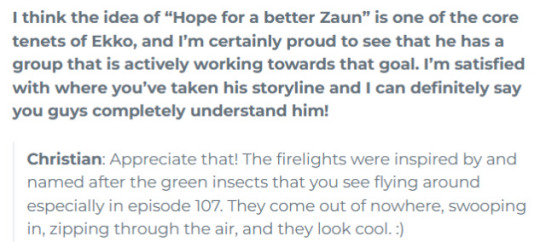
"Even though they were oppressed, they can innovate in ways Topside can't. Like well let's take this freedom we have because they don't care about us, and use it to find beauty and innovation. That's where Ekko's little conclave came in." Did they forget the literal orphans he rescued from those "shady streets"? What were they free from, their parents? Cause Piltover's enforcers seem to kill a lot of those despite "not caring". This is straight from Ekko's LoL lore where he spent his days being a kid running around with the Lost Children and inventing for fun. Arcane Ekko got Misfit Toys as an intro song. The Firelights were called a gang. These are not happy, healthy kids enjoying their world. They're vigilantes taking care of other kids who have nobody else.
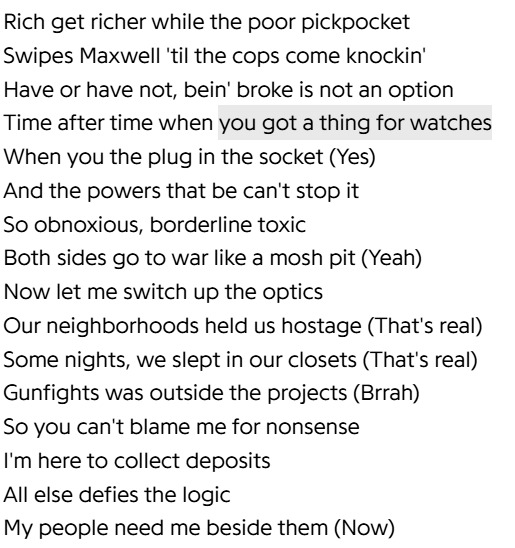

"Ekko emerged as one of the unlikely heroes of the show, rising to meet tough, sometimes heartwrenching challenges, and becoming a charismatic and beloved leader" His LoL lore is that of a self-educated genius described as "The Hero of Zaun's Youth". Beloved pretty firmly established already. Also charismatic...are we really not past the point where its not supposed to be a shock that a black guy can be articulate?
Sevika's arm is specifically described as "flamboyant", which was the same word used to describe Piltover's augments
This gave me the vibe that they were trying to glorify or romanticize Zaunites' suffering and environment, but on further reflection I think that's giving them way too much credit. Christian's reply below makes it pretty clear he doesn't understand his own story, and Alex's indicates they weren't even trying to tell it and are surprised by this interpretation. Because to them, the Zaunites were the bad guys all along.
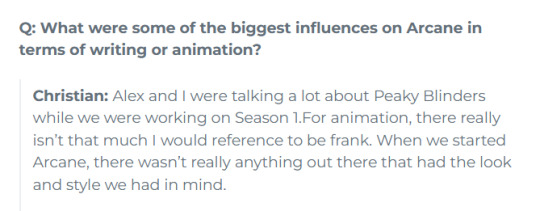


(Cool cool name one team member who has personal experience with living in under an oppressive ruling class that is either ignores their suffering or actively worsens it. I'll wait.)
Also, I think its very telling that a cocreator admits to having difficulty distinguishing between a group of systemically abused people fighting for their right to live on their own terms and people breaking the law because want power and influence and money. I don't think Peaky Blinders and the French and American Revolution (among others) are really compatible stories.
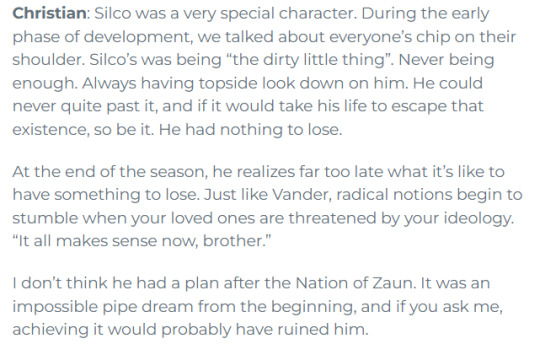

"It was an impossible pipe dream if you ask me." Well then. All the nations that successfully rose up and freed themselves from their oppressive overlords were just flukes I guess. Also I'm not sure how they managed to figure out the alien invasion lack of relatability and not realize that's basically what they ended up with. Also, the fact that they keep framing it as a civil war rather than a revolutionary one is mindbogglingly out of touch.
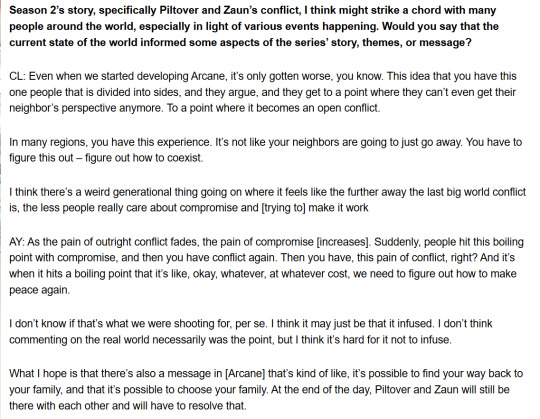


So they were trying to comment on the two party system, but also the point wasn't to comment on the real world. They wanted to show the widening wealth gap in a "fun way", but also that's not what they were shooting for. Over and over we've heard about how the show is about duality, the struggle of Jinx and Vi and the struggle of the two cities. If they didn't want to comment on the real world, didn't know enough about politics to even realize what they were doing or what message they sent, DON'T MAKE A $250 MILLION STORY ABOUT IT. Thanks to their contributions, we now have a story about two girls brutally traumatized by their environment enveloped in a pro-oppressor, forgive your abusers theme. Well I aint forgiving any of this.
I get the idea of "show, not tell", but some things do need to be explicitly told. Oppression is objectively wrong no matter who the oppressed are should not be left up to interpretation. Its not the viewers' job to piece together that Zaun's problems are ultimately caused by Piltover, especially since what they are shown is that death of a child makes the world a better place. Not once in 18 episodes do they ever explicitly condemn Piltover. Not once did they validate Zaun's right to independence. We got "forgiveness" (forgiving your abusers? great message) and "finding your way back to each other" (which none of the duos actually did. They're all "dead"). And my personal favorite, the important lesson that asexual people do not have happy, healthy, nonplatonic relationships, so TAKE THAT JAYVIK SHIPPERS.
Since they ended Arcane with a reference to a Japanese proverb, in the spirit of duality I'm ending with a quote by someone who actually has personal experience on the subject:
“If you are neutral in situations of injustice, you have chosen the side of the oppressor."- Desmond Tutu
#jayvik#asexual#asexual viktor#i'macedon't@me#arcane critical#arcane criticism#arcane critique#arcane analysis#arcane meta#art of arcane#arcane season 2#arcane league of legends#arcane season one#arcane ekko#arcane vi#arcane caitlyn#arcane silco#arcane sevika#arcane viktor#arcane jinx#piltover and zaun#arcane piltover#arcane zaun#classism#inequality#ableism#acephobia#antisemitism#oppression#christian linke
306 notes
·
View notes
Text
As a huge fan of both Lord of the Flies and Yellowjackets, I am absolutely loving the parallels between the rivalries of Ralph and Jack and Natalie and Shauna.

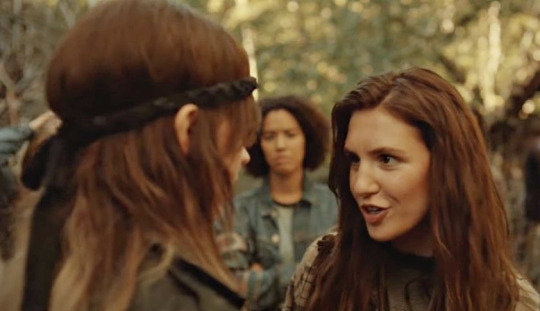
Ralph and Natalie are both true leaders, representing order, reason, and a desire to preserve civilization in an environment that is rapidly unraveling. Both serve as the group's skeptics and voices of reason, as Ralph argues against the boys’ belief in the “Beast,” while Natalie resists the growing mythology around the “Wilderness." Ralph and Natalie are both natural leaders, but their purely rational approaches to leadership fail to recognize and attend to the emotional turmoil in the group.
Both Ralph and Natalie attempt to impose rational structures onto situations that are, by nature, chaotic and emotionally charged. For example, Ralph insists on holding a democratic vote to determine whether or not ghosts exist (an irrational question that cannot be answered by logic or consensus), showing his desperate need to maintain order through reason. And similarly, Natalie orchestrates a trial to decide Coach Ben’s fate, complete with jurors and testimony, in an effort to bring a sense of fairness and procedure to a situation that is fundamentally driven by panic, grief, and vengeance. This is ultimately why they are both overthrown by Jack and Shauna respectively: their strong moral compasses and deep ties to the values of civilization leave them unable to match the escalating brutality and emotional intensity within the group.
As the characters most committed to reason and morality, Ralph and Nat also suffer the deepest guilt for the times they fail to uphold them (Ralph after briefly giving in to the group's frenzy and taking part in Simon's murder, and Natalie after joining in Jackie’s cannibalization and allowing Javi to die in her place). They suffer the most from their actions in the wild due to their inherent goodness.
And, (my favorite parallel) they both have their trusty sidekick/most devoted follower in Piggy and Misty, who are both intelligent, awkward social outcasts with broken glasses (the same lens too!). Piggy and Misty remain unwaveringly devoted to Ralph and Nat even when Ralph and Nat reject/betray them and even when it puts them at odds with the rest of the group.
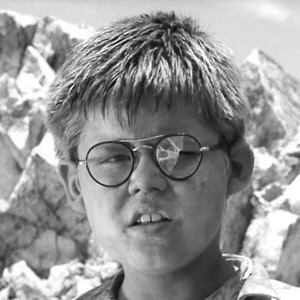
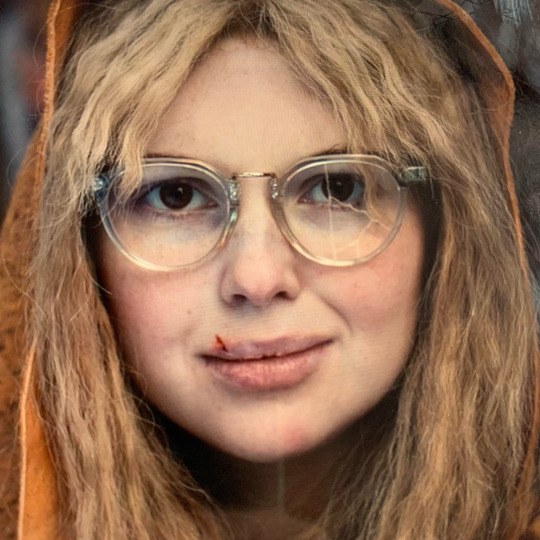
On the other hand, Jack and Shauna embody the descent into savagery and the intoxicating power of dominance. Shauna mirrors Jack’s journey, especially as she shifts from a passive follower (living under Jackie’s shadow) to an assertive, often violent survivor.
When Ralph is elected as the group’s leader, Jack is furious and humiliated, believing it should have been him, which is paralleled in Shauna’s resentment of Lottie choosing Natalie as the new leader. This resentment festers in Jack and Shauna over the course of Ralph and Natalie’s reigns. Jack and Shauna both long for an emotional release and empowerment that they cannot achieve under Ralph and Natalie’s civilized societies. They both find freedom in shedding the restraints of society and unleashing the rage and violence they have been burying. Jack and Shauna ultimately overthrow Ralph and Natalie by raising doubts and criticisms of Ralph and Natalie’s leadership and leaning into the group’s increasing fear, anger, and tension.

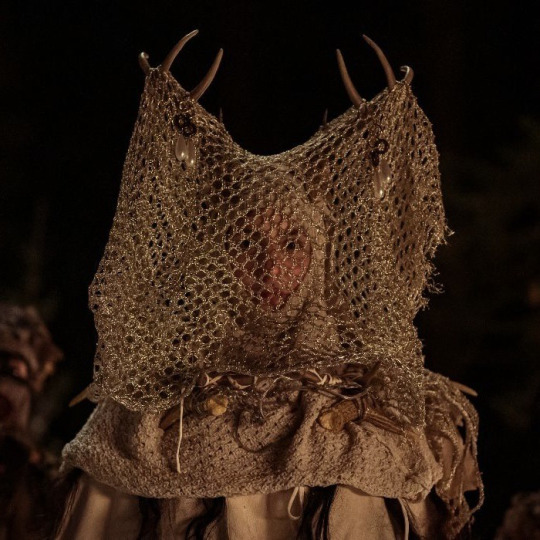
Jack and Shauna both recognize the power of fear, as they utilize intimidation to influence the group. Jack manipulates the boys’ fear of the Beast to control their behavior, using superstition and terror as tools to solidify his leadership. Similarly, Shauna weaponizes the group’s belief in the Wilderness, encouraging the group to elect her as the new leader and engage in acts of violence to “give the Wilderness what it wants” (despite not actually believing in the Wilderness herself). Like Jack, Shauna understands that fear and desperation can be a powerful instrument for control, allowing her to manipulate others and maintain authority.
And, underneath all of that rage and brutality, Jack and Shauna are both deeply insecure and vulnerable. Jack initially hesitates to kill a pig for the first time, showing an inner softness and humanity that he later tries to suppress through violence. He also breaks down crying when rescue finally arrives, showing that he is still just a frightened boy overwhelmed by the realization of his full descent into savagery (very similar to adult Shauna's sobs at the end of Season 3 when Jeff and Callie leave her). Shauna shows her vulnerability through her intense grief over Jackie and her baby (breaking down alone in the meat shed and refusing to let go of her baby's body) as well as her almost begrudging love for Jeff and Callie. They both ultimately just want to be seen.
While Yellowjackets is not a copy of Lord of the Flies by any means (it has plenty unique themes and divergences), the parallels between Ralph and Jack and Natalie and Shauna are so interesting and undeniable. Each pair embodies the war between logic and instinct, order and chaos, conflicts that remain just as compelling today as they were in 1954.
#no one else is going to care about this but I had fun making it so#yellowjackets#natalie scatorccio#shauna shipman#lord of the flies
145 notes
·
View notes
Note
I think you know that Alfred arranged Jason's memorial. I'd like to hear your opinion on what he originally put into it (and maybe a scene where he would explain to Jason)
i do, i do. you see, with comics (and DC, specifically) i love supporting a few different interpretations at the same time. i see and understand why most of the people hate how inconsistent the writing here is, and i also hate when they fundamentally change the character depending on the author, but sometimes it is an interesting tool to play with, though, i try to never change the character itself, just to analyse different situations from different point of views. thus, there are a few interpretations of Alfred being the one arranging the memorial, that i usually look at when i am writing something or creating a scenario!
the most popular one, is that it was supposed to be a punishment for Bruce. i, personally, have slight issues with this interpretation, though, i also use it on occasions. it is not a bad idea overall, but I don't think Alfred ever blamed Bruce for Jason's death (i don't think anyone did but Bruce himself, in fact), and Alfred is not exactly against the idea of Robins. and he loves Bruce so much. the last thing he wants, is to torture him, tbh. he does it to himself, anyway. but! i accept it sometimes as i said. it could work;
Alfred is an army man. the good soldier was never supposed to be an offence or berating. he, we saw, has a very different perspective of the world - different from anyone's in this family, to be honest. i think, he could mean it not as a bad thing. after all, that is just the way things were for him, back in the time;
my personal favourite, though, very self-indulgent: it is an inside thing, half-joke that was between Jason and Alfred back in the time. i wrote about it here once. it is up to you if Jason forgets about it after being back or not, honestly.
despite the interpretation, there are still a few interesting things to acknowledge in this situation, though.
first and foremost: Jason doesn't hate Alfred for it. i saw a lot of Jason fans, who spat on Alfred for this, but Jason would never, and Alfred, honestly, is one of the most dear people to Jason in the canon. he is not mad, i think, because he knows that whatever reason Alfred had in his mind when he put it, he didn't mean ill to Jason.
here comes the logical question - if so, why Bruce is blamed for that and Jason actually calls out him for it? well, mostly because of how Bruce sees this memorial and interprets it himself. because he never tried to take it off, if he felt like it was a bad thing. and because when Jason comes back, Alfred wants to hide the memorial, but Bruce stops him and says that it changes absolutely nothing - Jason's return changes nothing, his son is dead, and keeps the ghost of Jaybin in the Batcave to haunt him and further use the memory of the kid as a form of self-punishment.
yeah.
anyway.
hopefully, i answered to your question!
#mind you it was a simple question and i spiralled it in the essay#literally stopped myself in the middle before typing another five parts of this lol#— lie answering#jason todd#red hood#batman#dcu#dcu comics#dc universe#bruce wayne#alfred pennyworth
100 notes
·
View notes
Note
Do you have any advice for writing Mace Windu?
Hello friend! I've been sitting on this for a while, because everyone's got their own interpretations, but mine is based on an idea I was struggling to put words to.
(Caveat that I have not read Legends material, that people can write what they like, etc. etc.)
The way I see it, Lucas specializes in writing stories in terms of themes and archetypes. This is why certain dialogue choices or the development of certain relationships can be... clunky, let's go with that. Characters (Obi-Wan and Anakin fall into their own category, sure) are written primarily as archetypes. You have Yoda as the wise old sage, Sidious as the ultimate evil-
And Mace Windu as the ultimate good.
We see this in the Chancellor's office, right? During the final showdown. This is the moment where Anakin makes his choice- stay in the Light or Fall- and the characters visually representing that choice are Palpatine and Mace. He's the Master of the Order. He's raised a Padawan who sits on the Council with him. He's an incredibly skilled swordsman- hell, his fighting style of choice (Vaapad) epitomizes how clearly he's mastered the art of internal balance!
All of that to say- his whole character is built around the idea that he is the Good Guy. That would be the one piece of writing advice I would give. If you're wondering how to write him, start with that idea- that he is written to represent the absolute opposite of Sidious. He's the ultimate good. He is the illuminating Light to Sidious' corrupting Dark. This is why antagonistic portrayals of him never ring true to me- they're coming from a foundational understanding that I simply do not subscribe to. It reeks of a fundamental misunderstanding of his character and of the whole saga's themes.
(And also racism. I'd be remiss if I didn't mention the racism that too often plays a significant role.)
All of that being said, what might it look like to write from the foundation of Mace being the representation of ultimate good? The good thing about characters being written as archetypes is that it gives us fans a significant amount of freedom in determining what those characters look like when they're written as characters. Different people will have different takes, but for me:
Well, first off- he's the epitome of a Jedi. So all of what that entails- he is fundamentally kind, fundamentally compassionate, and fundamentally in control of himself.
He's funny. I think he has a very dry sense of humor, and that he finds joy in the smallest things.
He loves so much. He loves his Padawan, he loves his friends, he loves his family, he loves the Republic- he loves the galaxy enough to go to war for it, and he loves the men who'll kill his people.
There will never be a situation where he has the capacity to help and chooses not to.
And last but not least, I choose to believe that this man can bake pastries with the best of them. In my heart of hearts, he's a stress baker, and he mends his socks with purple thread.
Hope this helps!
#pro mace windu#mace windu my beloved#i love him i love him so much#thank you for giving me a chance to ramble on about exactly how much!!#pro jedi#pro jedi order#mace windu only made one wrong decision in his life and that was trusting anakin#and even then he was only wrong because anakin let him down!#anakin was not worthy of the trust mace placed in him!!#and that's not mace's failing#it's anakin's
367 notes
·
View notes